|

Detail
Blaise Cendrars (1887-1961) | Sonia Delaunay (1885-1979).
La Prose du Transsibérien et de la petite Jehanne de France
[The Prose of the Transsiberian and of Little Jeannie of France].
Paris: Editions des Hommes Nouveaux, 1913
.....................................................
from
Trans-Siberian Prose and Little Jeanne from France
Blaise Cendrars
Introduction and translation by Ekaterina Likhtik
The Drunken Boat
The sky is like the shredded tent of a poor circus in a small fishing village
In Flanders
The sun is a smoky oil lamp
And at the very top of a trapeze a woman makes a moon.
The clarinet the piston a sharp flute and a bad tambourine
And here is my cradle
My cradle
It was always next to the piano when my mother like Madame Bovary played Beethoven sonatas
I spent my childhood in the Hanging Gardens of Babylon
And skipping school, in the railroad stations in front of departing trains
Now, I have made all the trains run behind me
Basel-Timbuktu
I have also bet on the races at Auteuil and at Longchamp
Paris – New York
Now, I have made all the trains run the course of my life
Madrid – Stockholm
And I lost all my bets
There is now only Patagonia, Patagonia, that suits my immense sadness, Patagonia, and a journey to the South Seas
I'm on the road
I've always been on the road
...(more)
_______________________
The Problem Of Consciousness
A Talk with Alva Noë
edge
We should reject the idea that the mind is something inside of us that is basically matter of just a calculating machine. There are different reasons to reject this. But one is, simply put: there is nothing inside us that thinks and feels and is conscious. Consciousness is not something that happens in us. It is something we do.
A much better image is that of the dancer. A dancer is locked into an environment, responsive to music, responsive to a partner. The idea that the dance is a state of us, inside of us, or something that happens in us is crazy. Our ability to dance depends on all sorts of things going on inside of us, but that we are dancing is fundamentally an attunement to the world around us.
And this idea that human consciousness is something we enact or achieve, in motion, as a way of being part of a larger process, is the focus of my work....(more)
_______________________
The Living Body [PDF]
Michel Henry
translation by Michael Tweed
If life is eliminated a priori from biology in the actual presupposition of this science, then where can it be found? Would it be in the world? In the world, do we not see, alongside inanimate things, living beings, living bodies and specifically our own life more or less similar to that of animals.
I will take a second risk, and formulate at the outset the thesis that will direct this entire analysis. In the world, there is nothing like life. In the world, life never appears and that, moreover, is why life is absent from the field of biology, because biology, despite the abstraction of its methodologies, still seeks life in the world, never ceasing to focus its gaze outwards at the world. In the world, admittedly, we do see living beings, living bodies, but never life. This character of being alive has a significance that is inherent to the perception of living bodies and which plays a crucial role in this perception. We grasp this character of being alive, signs of life, in the perception of these bodies, never life itself. This is because we never grasp life in itself, we only grasp it in the form of an irreal signification, i.e. an irreality. This signification can invest the living being and wholly determine the perception that we have of it, in such a way that these eyes, as Husserl says, are perceived as “eyes that see,” these hands are perceived as “hands that touch.” But such significations remain in their irreality, they only signify life without being able to present it in itself, in person, as phenomenologists say.
That is the philosophical reason why it is advisable, from now on, to reject Heidegger’s thesis which states that life is not the path that must be followed if one wants to arrive at what makes up the essential-being of man.
However Fallible
Fragments towards an aesthetics of frailty
via Dylan Trigg at Side Effects
_______________________

Sonia Delaunay
1885 – 1979 Sonia Delaunay at Spaightwood Galleries Delaunay design: aesthetics, immigration, and the new woman
Sherry Buckberrough
Art Journal, Spring, 1995
_______________________
John Ralston Saul interview
mother jones nov 2005
JRS: There are warning signals of [ideological thinking]—of ideas as religion—and one of them is this idea of inevitability. As soon as you hear somebody saying 'This is inevitable,' you basically know they have a weak case and are true believers in an ideology. Globalization has been immersed in just such an argument.
MJ: And it's an argument that doesn't have much use for the concept of the public good, correct?
JRS: Once you believe that the market is inevitable you start believing that the lower the taxes the bigger the growth, and the happier people will be. Well, there's absolutely no historic proof for that at all. That doesn't mean taxes can't be too high or that they can't be badly spent or that you can't have bureaucratic inefficiency—you can, but those are all different issues. But once people start believing that the sign that individual rights are being successfully asserted is that you're not paying taxes, then your society's in real trouble. There’s nothing wrong with paying taxes; they should be paid in proportion to how rich you are. This idea that you're going to get better growth by cutting taxes at the top has no historical justification. And it's certainly not an argument in favor of capitalism.
_______________________
A Credit Crisis or a Collapsing Ponzi Scheme?
The Two Trillion Dollar Black Hole
Pam Martens
_______________________
Cantico del Sole
The thought of what America would be like
If the Classics had a wide circulation
Troubles my sleep,
The thought of what America,
The thought of what America,The thought of what America would be like
If the Classics had a wide circulation
Troubles my sleep.
Nunc dimittis, now lettest thou thy servant,
Now lettest thou thy servant
Depart in peace.
The thought of what America,
The thought of what America,
The thought of what America would be like
If the Classics had a wide circulation...
Oh well!
It troubles my sleep.
Ezra Pound
Ezra Pound's "Cantico del Sole"
PoemTalk
a podcast series sponsored by
the Poetry Foundation | the Kelly Writers House | & PennSound
_______________________
Uncritical Exuberance?
Judith Butler
Very few of us are immune to the exhilaration of this time. My friends on the left write to me that they feel something akin to "redemption" or that "the country has been returned to us" or that "we finally have one of us in the White House." Of course, like them, I discover myself feeling overwhelmed with disbelief and excitement throughout the day, since the thought of having the regime of George W. Bush over and gone is an enormous relief. And the thought of Obama, a thoughtful and progressive black candidate, shifts the historical ground, and we feel that cataclysm as it produces a new terrain. But let us try to think carefully about the shifted terrain, although we cannot fully know its contours at this time. The election of Barack Obama is historically significant in ways that are yet to be gauged, but it is not, and cannot be, a redemption, and if we subscribe to the heightened modes of identification that he proposes ("we are all united") or that we propose ("he is one of us"), we risk believing that this political moment can overcome the antagonisms that are constitutive of political life, especially political life in these times.(....)
The indisputable significance of his election has everything to do with overcoming the limits implicitly imposed on African-American achievement; it has and will inspire and overwhelm young African-Americans; it will, at the same time, precipitate a change in the self-definition of the United States. If the election of Obama signals a willingness on the part of the majority of voters to be "represented" by this man, then it follows that who "we" are is constituted anew: we are a nation of many races, of mixed races; and he offers us the occasion to recognize who we have become and what we have yet to be, and in this way a certain split between the representative function of the presidency and the populace represented appears to be overcome. That is an exhilarating moment, to be sure. But can it last, and should it?
To what consequences will this nearly messianic expectation invested in this man lead?...(more)
_______________________
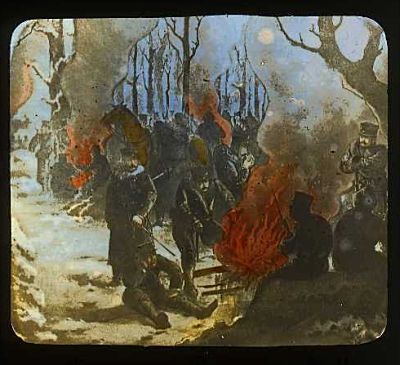 Forest Camp
Magic Lantern Slides
Collection from Japan via Plep - NY
_______________________
The Opacity of Hope
American Stranger
What sensible responses by people like Judith Butler(via) leave out, which exhort supporters to have their fun but be emotionally and practically ready for inevitable disappointment, is an analysis of how Obama’s rhetoric functions. They start from the assumption that his slogans are ‘empty’ in the sense of being without content, and therefore not worth taking seriously. She is led to question her naive friends, but not the political assumptions she shares with them. It’s of course true that Obama relies on the same myths of ‘the American people,’ the overcoming of internal division, freedom, and inevitable sacrifice as just about every president before him. But, while the language of American presidential politics may not change, emphasis and strategic function do. So it’s important to understand these shifts, no matter how minute they may appear when written in books.(....)Doesn't all the increasingly anxious speculation about Obama (this post included) have something to do with the fear that when he actually becomes president, something precious will have been lost? We already have intimations that this will be the case, though it's impossible to tell exactly how the actual dynamics of his relationship with his activists will play out. Just as ironic distance fails to negate its real investments, the image of Change fails to negate its material function as an image, a commodity bought and paid for by Wall Street with the American people as (now) minority shareholders. If the image America just opted into is that of Future President Obama giving our politics back to us, then the Left, if there is still to be one apart from Team Change, has to ask itself: would this obviously compromised image be so appealing if the practical (anti-) politics it enabled were not ten times more radical than the most radical of ideologies?...(more) _______________________
What’s Left After Obama?
Simon Critchley
Obama's victory marks a symbolically powerful moment in American history, defined as it is by the stain of slavery and the fact of racism. It will have hugely beneficial consequences for how the United States is seen throughout the world. His victory was also strategically brilliant and his campaign transformed those disillusioned with and disenfranchised by the Bush administration into a highly motivated and organized popular force. But I dispute that Obama's victory is about change in any significant sense.
Obama's politics is governed by an anti-political fantasy. ...(more)
_______________________
Obama's plans for probing Bush torture
Mark Benjamin
With growing talk in Washington that President Bush may be considering an unprecedented "blanket pardon" for people involved in his administration's brutal interrogation policies, advisors to Barack Obama are pressing ahead with plans for a nonpartisan commission to investigate alleged abuses under Bush.
_______________________
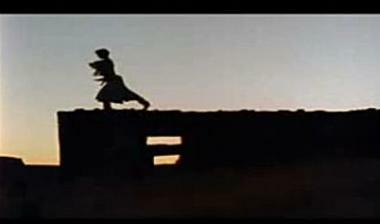
The Burning Times
Directed by Donna Read
National Film Board of Canada
All six parts are up at
mirabile dictu
youtube links
.....................................................
Bewitched
The difficulty of understanding why one half of society tried to wipe out the other.
Jessa Crispin reviews John Demos' The Enemy Within: 2,000 Years of Witch-hunting in the Western World _______________________

Olga Rudge
1897 Young and Modern
Room 26 Cabinet of Curiosities Beinecke digital collection via with hidden noise
_______________________
from "The Cure at Troy "
Seamus Heaney
Human beings suffer,
they torture one another,
they get hurt and get hard.
No poem or play or song
can fully right a wrong
inflicted or endured.
The innocent in gaols
beat on their bars together.
A hunger-striker's father
stands in the graveyard dumb.
The police widow in veils
faints at the funeral home.
History says, Don't hope
on this side of the grave.
But then, once in a lifetime
the longed for tidal wave
of justice can rise up,
and hope and history rhyme.
So hope for a great sea-change
on the far side of revenge.
...(more)
courtesy of Philip Metres
Behind the Lines: Poetry, War, & Peacemaking
The Cure at Troy: A Version of Sophocles' Philoctetes
Seamus Heaney amazon
_______________________
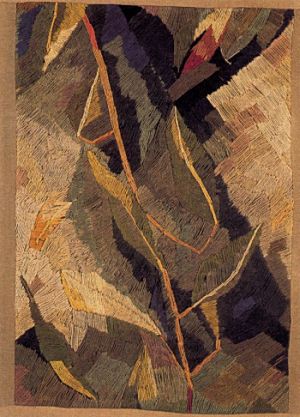
Sonia Delaunay
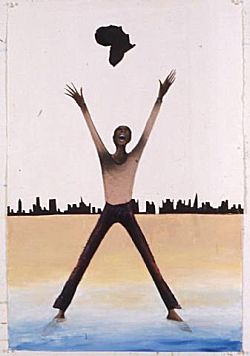
Afro-American Fragments
(Langston Hughes Series)
Benny Andrews
2005
_______________________
SAY not the struggle naught availeth,
The labour and the wounds are vain,
The enemy faints not, nor faileth,
And as things have been they remain.
If hopes were dupes, fears may be liars;
It may be, in yon smoke conceal'd,
Your comrades chase e'en now the fliers,
And, but for you, possess the field.
For while the tired waves, vainly breaking,
Seem here no painful inch to gain,
Far back, through creeks and inlets making,
Comes silent, flooding in, the main.
And not by eastern windows only,
When daylight comes, comes in the light;
In front the sun climbs slow, how slowly!
But westward, look, the land is bright!
Arthur Hugh Clough
Jan 1 1819 - Nov 13, 1861
_______________________
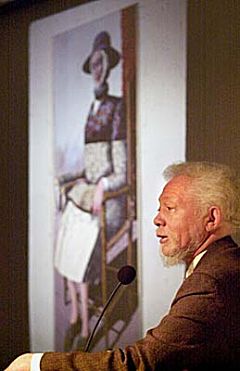
Benny Andrews
November 13, 1930 - November 10, 2006
photo - Jonathan Ernst
_______________________
A Grammar of the Multitude
For an Analysis of Contemporary Forms of Life
Paulo Virno
Translated from the Italian by Isabella Bertoletti, James Cascaito, Andrea Casson
FOREWORD: We, the Multitude
Sylvère Lotringer
Paolo Virno's A Grammar of the Multitude is a short book, but it casts a very long shadow. Behind it looms the entire history of the labor movement and its heretical wing, Italian "workerism" (operaismo), which rethought Marxism in light of the struggles of the 1960s and 1970s. For the most part, though, it looks forward. Abstract intelligence and immaterial signs have become the major productive force in the "post-Fordist" economy we are living in and they are deeply affecting contemporary structures and mentalities. Virno's essay examines the increased mobility and versatility of the new labor force whose work-time now virtually extends to their entire life. The "multitude" is the kind of subjective configuration that this radical change is liberating, raising the political question of what we are capable of.(....)"It is doubtful that the joys of capitalism are enough to liberate the people," Deleuze wrote in 1991.14 "Those who keep invoking the bloody failure of socialism don't seem to consider as a failure the present state of the global capitalist market, with the bloody inequalities it involves, the populations pushed off the market, etc. It's been a long time since the American `revolution' has failed, even before the Soviet's did. The situations and revolutionary attempts are generated by capitalism itself and they are not going to disappear." Capitalism itself is revolutionary because it keeps fomenting inequality and provoking unrest. It also keeps providing its own kind of "communism" both as a vaccine, preventing further escalation, and an incentive to go beyond its own limitations. The multitude responds to both and can go either way, absorbing the shocks or multiplying the fractures that will occur in unpredictable ways.
A specter haunts the world and it is the specter of capital......(more)
_______________________
What Doesn't Kill The Far-Right Only Makes Them Crazier
Bob Cesca
For the last eight years, we've observed Karl Rove's non-reality based universe in which logic was entirely abandoned in lieu of whatever reality the administration invented in order to serve its ridiculous policies and to mask its glaring nincompoopery. Intellectually dishonest at best -- destructive and criminal at worst.
This didn't end on Election Day.
Since their thumpin' last week, the far-right has pushed the crazy to eleven and snapped the knob clean off -- an opening salvo of twisted hackery portending an insane four-to-eight years of attacks on the Obama administration. If the last seven days have been any indication, the far-right is shaping up to make the 1990s seem quaint -- even erudite by comparison. That which used to be your basic, off-the-shelf intellectual dishonesty has grown into, as Digby pointed out last week, full-on intellectual violence.
Intellectual violence. While not a new term, it perfectly defines what we're seeing now: accusations and smears that so severely confound logic they literally attack -- violate -- reality and the human intellect. It's like a berkzerker dervish of argumentative elbows and fists indiscriminately flailing around, thwacking anything in its orbit, so much so that constructing a counterpoint is literally painful, "Why the hell am I trying to debunk this?! Ow! My head. Aw hell, I need a drink."...(more)
_______________________
Obama's Win and the Ten Lies The Right Is Spreading About It
Michael Giltz
_______________________
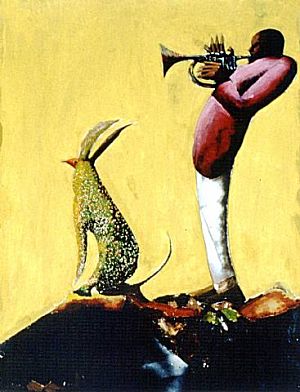
Strangers in Paradise
Benny Andrews
_______________________
Christ Über Alles
An interview with Jeff Sharlet
The religion reporter talks about his experiences with "the Family," the secret Christ-loving, Hitler-quoting powerbrokers of the modern world.
Guernica
One of the most interesting things about anti-intellectualism in American life is that it’s a very intellectual project. Real anti-intellectualism, the Family kind, you know, “Jesus plus nothing,” the systematic stripping away of history, of theology, of any kind of influence—that’s an intellectual project. Not for nothing does Doug Coe express some admiration for Pol Pot. In year zero, he did the same thing. Pol Pot had all the intellectuals killed. You only do that if you have an idea. That’s an extreme form of ideology that says: I can purify things.
There are two great traditions that have been written about before, which are American rationalism and American sentimentalism. What you see in the Family’s expression of power is that these are not two opposite poles, but the head and heart, the realpolitik of world power. The sentimental narrative, which is anti-intellectual—is absolutely interwoven with the rationalist Family agenda....(more)
_______________________
Forget Red vs. Blue -- It's the Educated vs. People Easily Fooled by Propaganda
Chris Hedges
We live in two Americas. One America, now the minority, functions in a print-based, literate world. It can cope with complexity and has the intellectual tools to separate illusion from truth. The other America, which constitutes the majority, exists in a non-reality-based belief system. This America, dependent on skillfully manipulated images for information, has severed itself from the literate, print-based culture. It cannot differentiate between lies and truth. It is informed by simplistic, childish narratives and cliches. It is thrown into confusion by ambiguity, nuance and self-reflection. This divide, more than race, class or gender, more than rural or urban, believer or nonbeliever, red state or blue state, has split the country into radically distinct, unbridgeable and antagonistic entities.(....)
As we descend into a devastating economic crisis, one that Barack Obama cannot halt, there will be tens of millions of Americans who will be ruthlessly thrust aside. As their houses are foreclosed, as their jobs are lost, as they are forced to declare bankruptcy and watch their communities collapse, they will retreat even further into irrational fantasy. They will be led toward glittering and self-destructive illusions by our modern Pied Pipers--our corporate advertisers, our charlatan preachers, our television news celebrities, our self-help gurus, our entertainment industry and our political demagogues -- who will offer increasingly absurd forms of escapism....(more)
_______________________
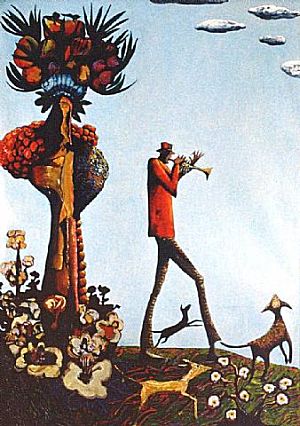
Walking the Dog Blues
Benny Andrews
1998
_______________________
The Hole:
Death, Sexual Difference, and Gender Contradictions in Creeley’s Poetry
Rachel Blau DuPlessis
jacket
The books Life & Death (1998), Just in Time (2001), and If I were writing this (2003) reveal that Creeley, at around age 72 or so, started thinking hard about the ways it feels to be on the downward side of his life; he would die too soon at 78 years (in 2005). With that consummate spin on colloquialisms for which Creeley is justly famous, just means living precisely, exactly, simply, certainly, come as you are, in time. Poised in time — as Creeley was always poised and in motion in the poetry. Creeley’s meditations on death and its surround involve reiterated questions, extensions of the ethical questions about time that he asked continuously throughout his life — how to use this time, how to be situated in time, how to register time in his particular off-beat way.
In his last years, he articulated feelings about entering the common place, the common experiences, being just like everyone else. He brought to this meditation all the twists and turns in consciousness for which he is justly known, the semantic images, the deictic pointing, his sense of the forthcoming there-ness (which is blank) and the present here-ness (which is full) — affirmation and anxiety, plenitude and suspicion all missed up together. I mean messed up together.
There’s
‘I’m here/ I’m still here,”
and there’s
‘he counts his life/ like cash in emptying pockets./ Somebody better help him’ (2001, 141; 1998, 4).
There’s the depression and the acceptance, the reluctance, the foreknowledge, and the jaunty denial
(‘Not me’s going!’) (1998, 73).
Creeley also brought to this task his continuous checking on the body, its placement in time, in space, and in syntax — which were both of these others together — and his intimate account of the body’s functioning and intactness — intactness and vulnerability being his long-standing themes. As always, Creeley was precise, frank and not squeamish about tracking shifts of consciousness and feeling, in the oscillation, pulses and the balance/imbalance of syntax, linebreak, diction and semantic image. Thinking was words, it was not contained in words: he concentrated on substance in the instant and instance of its articulation. Far from being morbid, his proleptic and recursive focus on death is a triumph of secular meditation....(more)
_______________________

Tango with Cows: Ferro-concrete Poems
Moscow, 1914
Russian Avant-Garde Books
Selected Digitized Books
Tango with Cows:
Book Art of the Russian Avant-Garde, 1910-1917
At the Getty Research Institute, the Getty Center
November 18, 2008-April 19, 2009
via Charles Bernstein
_______________________
[the tongues our legends lose]
Craig Santos Perez
At first, narratives were spoken,
on which all others stand. So we begin
again with an offering to ghosts,
with ‘habitus’ and ‘costume.’ We mark
the evolution of legend and the tongues
our legends lose. You ask, “how will we save
the stolen hours when only a particular dwelling,
that of the field, remains?”
We compare ‘spine’ and ‘building,’
trace the intersecting angles from signs
to stairs we can’t descend. We look
for the shadows already here to lengthen.
You say, “it’s more than ‘in proximity,’
more than ‘near to know what here was.’”
We listen to a silence that only refers
to another luminosity, a compass
based on ocean currents, an anchor
to translate ‘direction.’
Three poems
Craig Santos PerezHot Metal Bridge
the literary journal of the University of Pittsburgh.
Craig Blogs at my blog did this to me_______________________
The politics of friendship
Jacques Derrida
Translated by George Collins
pdf
_______________________
 Hoarfrost
Camille Pissarro
ca.1830-1903 863 images here
_______________________
And now good-morrow to our waking souls,
Which watch not one another out of fear;
For love all love of other sights controls,
And makes one little room an everywhere.
Let sea-discoverers to new worlds have gone;
Let maps to other, worlds on worlds have shown,
Let us possess one world; each hath one, and is one.
-
John Donne, The Good Morrow
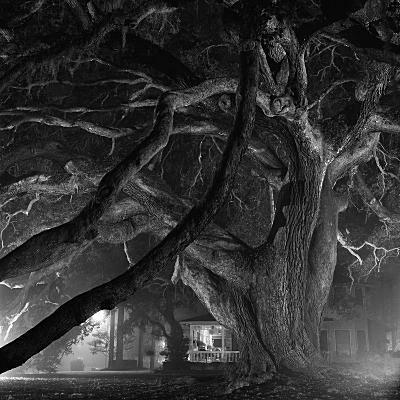
Adam Kuehl
featured in
25 Under 25
Up-and-Coming American Photographers
The Digital Journalist
_______________________
Desert Islands and Other Texts (1953-1974)
Gilles Deleuze
translated by Michael Taormina
scribd
... everything that geography has told us about the two kinds of islands, the imagination knew already on its own and in another way. The élan that draws humans toward islands extends the double movement that produces islands in themselves. Dreaming of islands - whether with joy or in fear, it doesn't matter - is dreaming of pulling away, of being already separate, far from any continent, of being lost and alone - or it is dreaming of starting from scratch, recreating, beginning anew. (....) It is no longer the island that is separated from the continent, it is humans who find themselves separated from the world when on an island. It is no longer the island that is created from the bowels of the earth through the liquid depths, it is humans who create the world anew from the island and on the waters. Humans thus take up for themselves both movements of the island and are able to do so on an island that, precisely, lacks one kind of movement: humans can drift toward an island that is nonetheless originary, and they can create on an island that has merely drifted away. On closer inspection, we find here a new reason for every island to be and remain in theory deserted.
An island doesn't stop being deserted simply because it is inhabited. ....
thanks to Madame Lévy (La Vache Qui Lit)
_______________________

Roland Barthes
Nov 12, 1915 – March 25, 1980
Roland Barthes
By Graham Allen
Google Books
The Discourse Of History
Roland Barthes
translated by Stephen Bann
Elements of Semiology
Roland Barthes
The Rustle of Language
Roland Barthes
translated by Richard Howard
Google Books
The Semiotic Challenge
Roland Barthes
translated by Richard Howard
Google Books
Photography Quotations by Roland Barthes
_______________________
War Money Magic
Triple Canopy - Issue 4
_______________________
The Golden Notebook Project
On November 10th, The Institute for the Future of the Book kicks off an experiment in close reading. The seven women listed below will read Doris Lessing's The Golden Notebook and carry on a conversation in the margins. The seven readers will also record their reactions to the process in a group blog. There is also a public forum in which everyone who is reading along and following the conversation can post their comments on the book and the process itself.
Note: This is not essentially an experiment in online reading itself. Although the online version of the text is quite readable, for now, we believe books made of paper still have a substantial advantage over the screen for sustained reading of a linear narrative. So you may also want to suggest to your readers that they order copies of the book now. Whichever edition of the book someone reads (US, UK or online), there is a navigation bar at the top of the online page will help locate them within the conversation.
_______________________
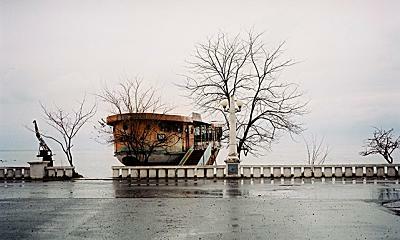
Rob Hornstra .....................................................
A Conversation with Rob Hornstra
Jörg Colberg
I don't view self-publishing as extra work. It is a part of my work and actually one of the parts, which I like the most. I don't see myself as a photographer in a way that I am always carrying a camera or that I always need to make pictures. I never make pictures, only when I am working on a documentary. Actually, I think when asked for my occupation I should answer that I am not a photographer, but a documentary maker. In this profession you need to do lots of things: Organizing money, a lot of self-study, of course making photos, publishing books, writing articles etc etc. Making photos is only a small part of the job.(....)
I believe that documentary photography is a form of art. Just like 'autonomous photography' (I don't know how you call this in English). By the way, there are many overlaps between these forms. Somebody wrote that one of the most general explanations of art is that art is an expression of the human soul. That is exactly what documentary photography is. Otherwise it is not documentary.
I believe photojournalism is something else. Not better or worse or more difficult or easier or whatever. I do not believe that journalism is independent (you know everything about that in the US), but I believe that the goal of the photojournalist should be to focus objectively on what is happening at a certain moment and not what his/her opinion is about it. That stands in contrast with making a documentary where the most essential part is your opinion. However, I realize that being independent for journalists is almost impossible. I think inside every journalists there hides a (small or big) documentary maker....(more)
_______________________
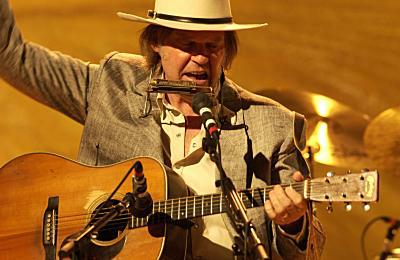
Neil Young
b. November 12, 1945
Neil Young saved my life
Kevin Chong
From the book Neil Young Nation
This is strange but true: everything I know about being young I learned from Neil Young, a jowly man approximately twice my age and now hurtling toward senior citizenship. “Well, I keep gettin’ younger,” he sings in “Crime in the City,” “My life’s been funny that way.” He bristles against expectations; he chooses spontaneity over precision, passion over perfection. This was exactly what I wanted in my life, in my art. What Young called reckless abandon. The expressions go kid at heart or old soul, but these are mere consolations for most people. For Young, old is a choice, a train you can elect not to board. Being young is an awareness of possibility, an unwillingness to stick with what one already knows and lead with one’s strengths. And, in my opinion, this frame of mind is much harder to achieve than the physical agelessness exemplified by news readers or yoga instructors.
_______________________
Play It Again, Sam
Songs of the Labor and Progressive Movements of the 1940's at Labor Arts
Labor Arts via Andrew Abb
_______________________
An SOS from the south
Eduardo Galeano
“Nature is very tired," wrote the Spanish monk Luis Alfonso de Carvallo. That was in 1695. Would that he could see us now.(....)
Frankenpower shrugs his shoulders: when this planet ceases to be profitable, I will move to another.
Beauty is beautiful if it can be sold and justice is just if it can be bought. The planet is being murdered by this way of life, just as we are being paralysed by machines invented to accelerate move- ment and isolated by the cities originally created for bringing people together. Words lose their meaning. And the green sea and the blue sky lose their colour, painted as they were by the algae that kindly wafted oxygen during 3,000 million years.
Are these little night-lights spying on us? The stars shake with astonishment and fear. They are at a loss to understand how this world of ours, so ardently bent upon its own annihilation, goes on being alive. And they tremble with shock, because they have seen that this world has begun invading other heavenly bodies....(more)
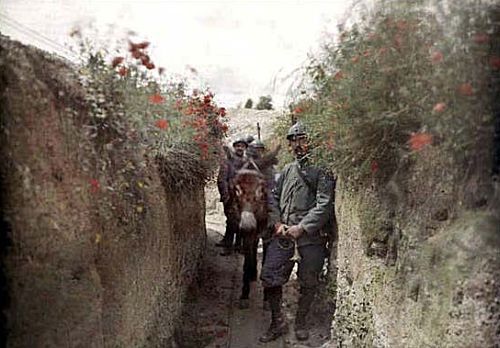
Poppies
Spring 1916
The Heritage of the Great War
_______________________
The Conscientious Objector
Karl Shapiro
The gates clanged and they walked you into jail
More tense than felons but relieved to find
The hostile world shut out, the flags that dripped
From every mother’s windowpane, obscene
The bloodlust sweating from the public heart,
The dog authority slavering at your throat.
A sense of quiet, of pulling down the blind
Possessed you. Punishment you felt was clean.
The decks, the catwalks, and the narrow light
Composed a ship. This was a mutinous crew
Troubling the captains for plain decencies,
A Mayflower brim with pilgrims headed out
To establish new theocracies to west,
A Noah’s ark coasting the topmost seas
Ten miles above the sodomites and fish.
These inmates loved the only living doves.
Like all men hunted from the world you made
A good community, voyaging the storm
To no safe Plymouth or green Ararat;
Trouble or calm, the men with Bibles prayed,
The gaunt politicals construed our hate.
The opposite of all armies, you were best
Opposing uniformity and yourselves;
Prison and personality were your fate.
You suffered not so physically but knew
Maltreatment, hunger, ennui of the mind.
Well might the soldier kissing the hot beach
Erupting in his face damn all your kind.
Yet you who saved neither yourselves nor us
Are equally with those who shed the blood
The heroes of our cause. Your conscience is
What we come back to in the armistice.
_______________________
A Salute to a Brave and Modest Nation
Kevin Myers
April 21, 2002 edition of the Sunday Telegraph
...it is a general rule that actors and filmmakers arriving in Hollywood keep their nationality — unless, that is, they are Canadian. Thus Mary Pickford, Walter Huston, Donald Sutherland, Michael J. Fox, William Shatner, Norman Jewison, David Cronenberg and Dan Aykroyd have in the popular perception become American, and Christopher Plummer, British. It is as if, in the very act of becoming famous, a Canadian ceases to be Canadian, unless she is Margaret Atwood, who is as unshakably Canadian as a moose, or Celine Dion, for whom Canada has proved quite unable to find any takers. Moreover, Canada is every bit as querulously alert to the achievements of its sons and daughters as the rest of the world is completely unaware of them. The Canadians proudly say of themselves — and are unheard by anyone else — that 1% of the world’s population has provided 10% of the world’s peacekeeping forces. Canadian soldiers in the past half century have been the greatest peacekeepers on Earth — in 39 missions on UN mandates, and six on non-UN peacekeeping duties, from Vietnam to East Timor, from Sinai to Bosnia....(more)via Doug Alder
_______________________
A Tribute To The Canadian Volunteers In The Spanish War
Terry Glavin
Unlike the American volunteers who fought in Spain, the Canadians had no Ernest Hemmingway, Martha Gellhorn or John Dos Passos to valorize them. Unlike the British, the Canadians had no W.H. Auden, Stephen Spender or George Orwell. Only 32 of the Canadian volunteers are known to have had any kind of post-secondary education.
And yet to Spain the Canadians went, to take up arms in defense of the Spanish Republic. Madrid's leftist government had been abandoned by the west's great democracies, left to fend for itself against several divisions of Spanish troops and 75,000 Arab mercenaries from Morocco, commanded by the Spanish general Francisco Franco. Another 75,000 soldiers, 660 aircraft, 150 tanks, and a trove of munitions were at Franco's disposal, provided by Italian dictator Benito Mussolini, and Germany's Nazi regime had sent in a further 16,000 soldiers, 600 fighter and bomber aircraft, and 200 tanks.
The Canadian anti-fascist volunteers were workers, "far more proletarian" than the British or the American volunteers, the Spanish War veteran Irving Weissman recalled years later. In Spain, they fought like lions. They fought barefoot and ate grass, and at least 400 of them never made it home. "They were very, very working class. The overwhelming majority – it was stamped on them," Weissman remembered....(more)
_______________________
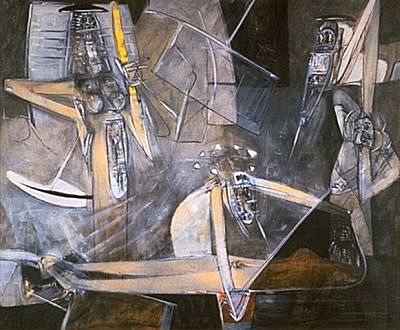
Let's Phosphoresce by Intellection
Roberto Matta
Nov 11, 1911 - Nov 23, 2002
_______________________
From For the Fighting Spirit of the Walnut
Takashi Hiraide
Translated from the Japanese by Sawako Nakayasu
The Literary Review
It is now time to describe, towards a mossy nothingness, the shape of a fragment. The moment a shipwreck seeks—against its will—the pretense of wings, and when the eraser under the eaves just about to disappear first comes to face itself, and when this too is nothing more than a short-lived illusion. The sharp brilliance of the fragment criticizes the sharp form. I follow the contours of the blade. Not for purposes of sketching, but in order to make an agreement with the sweat of things at the moment the line tears, and to cross over to the next shape. ...(more)
For The Fighting Spirit of the Walnut Takashi Hiraide
Translated from the Japanese by Sawako Nakayasu, Bilingual New Directions Publishing
Reviewed by Alan Gilbert
I don’t particularly like walnuts—they taste woody; their texture is borderline mealy; and they ruin anything they’re added to, especially ice cream. I’m not sure how much Hiraide enjoys them either, but I bet he admires their Deleuzian folds and resemblance to a cerebral cortex. On a related note, although I like the idea of poetry, I don’t always like poetry itself. Hiraide also seems ambivalent, given the book’s assault on various conventional poetic structures. In Nakayasu’s introduction, she quotes Hiraide as saying: “There came a point when I could no longer stand to speak about poetics with those who were unwilling to consider poetry from an external distance.” A sense of resistance as a resistance to sense is fundamental to Hiraide’s approach, and is part of the walnut’s “fighting spirit.” In another book, Hiraide compares poetry to baseball. For the Fighting Spirit of the Walnut similarly doubles as a book on poetics, and specifically of the fragment borne by a poetic line where the literal lives in pieces....(more)
_______________________
On the Subject of Regrettable Searching - Body to Body, the Filmed Body
Nicole Brenez
Necessarily, the body is a source of worry: subject to accident, decline, death, it is that from which we must escape by, for example, leaving figurative traces that others perhaps will consider art. This familiar torment is today renewed by collective concerns, human beings live henceforth in the grip of muffled yet violent questions: our body is the object of industrial and scientific initiatives about which we must make decisions, most often without being fully informed, to what extent do they constitute elements of progress or invasive attacks. Cut up slice by slice into digital images (this is the present state of humanism's glorious emblem, the flayed body), clonable, patented down to its genetic components, the body seems entirely open to examination, externalised and freely reproducible: the classical characteristics of the modern image suddenly move through the body, serving as a laboratory for its future. In the same way that the body has been reduced by war to the status of “cannon fodder” or by the economy to that of “labour power”, it becomes industrial raw material in a movement of confiscation which injects the unhuman into the deepest characteristics of the species.(....)
In its collective dimension, the whole of cinema appears like a vast formal inquiry into the nature of presence. As something that is simultaneously a trace, a reconstitution and a flickering, the figurative material appears in the state of a fetish, it is a sample, offering or not a hypothesis on being. As Philippe Garrel put it: “There is a solidarity between real artists and revolutionaries, because they both refuse ordinary identifications.” Cinema could have the almost anthropological function of reminding us of what is possible for the body, of sending us image constructions which make it impossible to limit the organism to its determining factors....(more) via Mubarak Ali at Supposed Aura
Ardèche Images > États généraux du film documentaire > Programme 2008
_______________________
Bodies that Matter: On the Discursive Limits of 'Sex'
Judith Butler
pdf download
_______________________
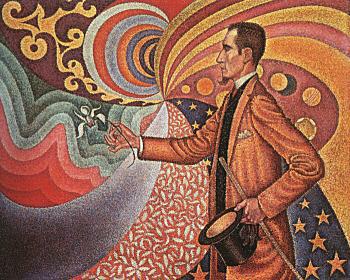
Portrait of Félix Fénéon
in Front of an Enamel of a
Rhythmic Background of Measures
and Angels, Shades and Colors.
1890
Paul Signac
Nov 11, 1863 – Aug 15, 1935
_______________________
Two Paths for the Novel
Zadie Smith
From two recent novels, a story emerges about the future for the Anglophone novel. Both are the result of long journeys. Netherland, by Joseph O'Neill, took seven years to write; Remainder, by Tom McCarthy, took seven years to find a mainstream publisher. The two novels are antipodal—indeed one is the strong refusal of the other. The violence of the rejection Remainder represents to a novel like Netherland is, in part, a function of our ailing literary culture. All novels attempt to cut neural routes through the brain, to convince us that down this road the true future of the novel lies. In healthy times, we cut multiple roads, allowing for the possibility of a Jean Genet as surely as a Graham Greene.
These aren't particularly healthy times. A breed of lyrical Realism has had the freedom of the highway for some time now, with most other exits blocked.(....)
If Netherland is a novel only partially aware of the ideas that underpin it, Tom McCarthy's Remainder is fully conscious of its own. But how to write about it? Immediately an obstacle presents itself. When we write about lyrical Realism our great tool is the quote, so richly patterned. But Remainder is not filled with pretty quotes; it works by accumulation and repetition, closing in on its subject in ever-decreasing revolutions, like a trauma victim circling the blank horror of the traumatic event. It plays a long, meticulous game, opening with a deadpan paragraph of comic simplicity:
About the accident itself I can say very little. Almost nothing. It involved something falling from the sky. Technology Parts, bits. That's it, really: all I can divulge. Not much, I know.
It's not that I'm being shy. It's just that—well, for one, I don't even remember the event. It's a blank: a white slate, a black hole. I have vague images, half-impressions: of being, or having been—or, more precisely, being about to be—hit; blue light; railings; lights of other colours; being held above some kind of tray or bed.
...(more)
.....................................................
Smith Essay Redux
Scott Esposito
Over the weekend I came back to the Zadie Smith essay in the current NYRB. It's really the kind of thing we should be seeing in more literary periodicals.
What you have here are two somewhat recent books paired for significant reasons (i.e. more incisive than that they're both memoirs, or both take place in India, or whatever). Though it's far from academic or pedantic, the piece has a discernible thesis to it, and it discusses an issue that's paramount to the "global literary community."
In other words, Smith's piece isn't just some omnibus review or your typical review/essay that pretty much sticks to extolling the virtues of one book or one author. Right from the title ("Two Paths for the Novel") you know you're about to read something that's going to try and move a certain debate forward. Refreshing....(more)
_______________________

Passchendaele
Nov. 1917
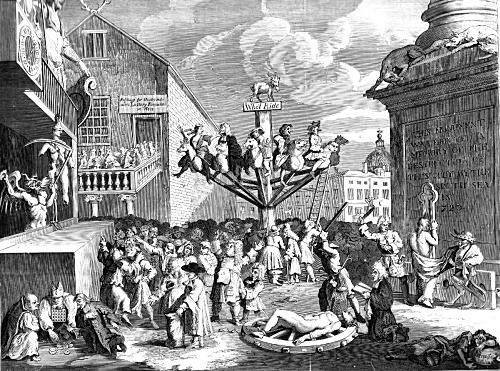
South Sea Scheme
William Hogarth
Nov 10, 1697 - Oct 26, 1764
The South Sea Company
Wikipedia
_______________________
Why Traditional Recession Tactics Are Doomed To Fail This Time
Umair Haque
Harvard Business Online
The first and simplest level is a change in global patterns of savings, investment, and consumption. For too long, the poor have financed the rich. China and other emerging markets have lent to the US so Americans could buy Hummers, McMansions, and Frappuccinos. But this never made sense -- it was deeply unsustainable; the macroeconomic equivalent of a giant planetary fossil fuel engine. The days of export-led growth -- and it's flipside, force-fed consumption -- are numbered.(....)
On a second, and deeper level, strategists must rediscover the lost art of authentic value creation. Authentic, long-run value isn't created through arbitrage or gamesmanship -- what we too often confuse strategy for. Games of off-balance sheet accounting, currency hedging, capital structuring, so-called labour arbitrage -- where corporations simply shift to the lowest-cost, or most poorly regulated, sources of manpower -- don't create value. They just shift it around. Corporations who play this game of economic musical chairs are in for a rude awakening - because the music just stopped. And so they must rediscover the simple fact that value creation flows from making economic activities not just profitable in the short- run -- but meaningful over the long-run.(....)
On the third, and deepest, level, strategists must rediscover entirely new sources of advantage as old ones fade and decay. (....)
Tomorrow's sources of advantage aren't like yesterday's. They're not built on being able to exploit, dominate, or coerce more strongly than others -- they don't result from being harder, better, faster, stronger. They're about exactly the opposite: being softer, better able to fail, having the ability to be slower, gaining the capacity for tolerance and difference. Ultimately, they are about a true advantage -- one that accrues not just to the corporation, at the expense of people, society, or the environment; but one that accrues to all.(....)
...industrial era DNA is built to power a nakedly competitive advantage; one that's deliberately blind to being unfair, unsustainable, or flat-out imaginary.
There's a different way to say that. Discovering new sources of advantage depends on new DNA -- on building new kinds of institutions with entirely new capacities. Because, at root -- and as we'll discuss at length shortly -- the macro crisis isn't really a financial crisis, an economic crisis, a liquidity crisis, or a solvency crisis. It's an institutional crisis: the economic institutions of capitalism are in shock.
And though it's a scary, frustrating time -- the cool part is this: it's up to us to reimagine, reconceive, and reinvent them. We get to rethink the institutions of capitalism for a new century. ...(more) via Adam Arvidsson at Actics Blog
_______________________
The Republican Party is History
Andre Pachter
The brand itself is toxic. In the eyes of the youth, and people across the world, Republican stands for stupidity and incompetence.
A party that is against science and progress.
A party of ignorance and religious extremism.
An anti-intellectual party, in which feelings matter more than facts.
A party that hates big cities and despises art and culture.
A primitive party.
A holy-roller, hillbilly party.
Like it or not, that is its image.
Bill Buckley and Barry Goldwater must be rolling in their graves.
What will come of this Republican party? ...(more)
_______________________
Republicans meet to perform autopsy on its rotting corpse
Pam Spaulding
This is a party that seriously needs new ideas. All these folks need to do is play videos of various McCain/Palin rallies held around the country and take a look at who was attending them (and how they behaved). Bible-beaters, people who vote against their own interests, and bigots. Sadly that's their base, and it doesn't look like the America of the future; their world is shrinking.
_______________________
 Théophile Alexandre Steinlen
Nov 10, 1859 – Dec 13, 1923
_______________________
'He tried his best to veil it, but Obama is an intellectual'
Jonathan Raban
The best thing about living in the United States since Tuesday has been the gilt-edged assurance that, somewhere out there, very smart people are thinking and talking in a serious conversation from which narrow ideologues have been rigorously excluded.
We've elected as president someone who is empirical, cautious, conservative with a small "c", yet unusually sure of his own judgment when he makes it, which is often slowly. He's sure to disappoint those of his supporters who believe he can raise the dead, turn water into wine, and walk on water. But he has rescued the White House from the besotted rationalists of PNAC with their Platonist designs on the world, and restored it to the realm of common reason. It's a measure of the madness of the last eight years that, for this seemingly modest contribution to the nation's welfare (and not just this nation's), grown men and women wept in gratitude on Tuesday night....(more)
_______________________
Political Happiness–or Cruel Optimism?
Lauren Berlant
Supervalent Thought
...if you're like me, you have been inundated by condescending and vitalizing exhortations not to become naive or stupid where political happiness also is.
This bolus of anxiety expresses the fear that political happiness will lead to a flatlined complacent brain, diminished political judgment, and the revelation of your bad taste. The claim that anxiety makes you smart makes me laugh. But solidaristically, not condescendingly.(....)
...presuming a self-interested distinction between complexity and simplicity where attachment is concerned itself performs a fantasy that there are unmixed feelings and that people are ever simple. Even your grandmother wasn’t that simple, trust me. But you knew that. You just wanted someone to be simple so that you could reliably rest in proximity to the scene of the love.(....)
...about Obama, the neoliberal, gay-marriage compromised, “market guy…” Here’s what makes me politically happy about the event of Obama. He is the first mainstream politician in decades who loves the political process. He does not confuse “Washington” with politics. His organization’s practice of training other organizers demonstrates his commitment to producing skills for political world-building beyond his campaign.
In this way the event of Obama has already massively advanced the skills for democracy in the United States. In other ways he seems committed to constraining and even undermining what that might entail concretely. Protesting and appreciating, though, are some of what we do to maintain the optimism of any attachment. They keep you bound to the (political) scene, to the cognitive and affective difficulties of remaining critically present to desire....(more)
_______________________
An Essay on Liberation
Herbert Marcuse
pdf download
via Continental Philosophy
_______________________
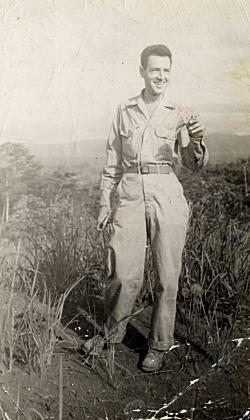
Karl Jay Shapiro
Nov 10, 1913 – May 14, 2000
photo ca. 1943
The Voyage
Karl Jay Shapiro
The ship of my body has danced in the dance of the storm
And pierced to the center the heavy embrace of the tide;
It has plunged to the bottomless trough with the knife of its form
And leapt with the prow of its motion elate from the bride.
And now in the dawn I am salt with the taste of the wave,
Which lies with itself and suspires, her beauty alseep,
And I peer at the fishes with jaws that devour and rave
And hunt in her dream for the wrack of our hands in the deep.
But the wind is the odor of love that awakes in the sun
The stream of our voyage that lies on the belt of the seas,
And I gather and breathe in the rays of the darkness undone,
And drift in her silence of morning and sail at my ease,
Where sponges and rubbery seaweeds and flowers of hair
Uprooted abound in the water and choke in the air.
- From Trial of a Poet, 1947
The Wild Card: Selected Poems, Early and Lateedited by Stanley Kunitz, David Ignatow Google Books_______________________
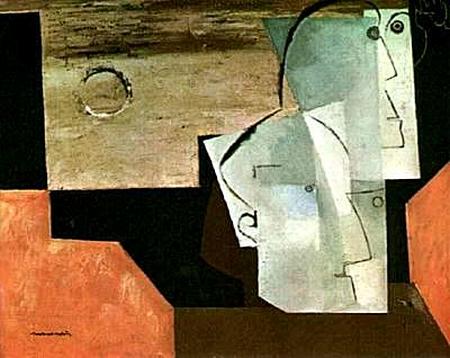
Two Poets
1929
Louis Marcoussis
ca.1883-1941
_______________________
The Positive Aspects Of Ambiguity
Simone de Beauvoir
translated from the French by Bernard Frechtman
... the oppressor would not be so strong if he did not have accomplices among the oppressed themselves; mystification is one of the forms of oppression; ignorance is a situation in which man may be enclosed as narrowly as in a prison; as we have already said, every individual may practice his freedom inside his world, but not everyone has the means of rejecting, even by doubt, the values, taboos, and prescriptions by which he is surrounded(....)
Perhaps it is permissible to dream of a future when men will know no other use of their freedom than this free unfurling of itself; constructive activity would be possible for all; each one would be able to aim positively through his projects at his own future. But today the fact is that there arc men who can justify their life only by a negative action.
(....)
The notion of ambiguity must not be confused with that of absurdity. To declare that existence is absurd is to deny that it can ever be given a meaning; to say that it is ambiguous is to assert that its meaning is never fixed, that it must be constantly won. Absurdity challenges every ethics; but also the finished rationalization of the real would leave no room for ethics; it is because man's condition is ambiguous that he seeks, through failure and outrageousness, to save his existence. Thus, to say that action has to be lived in its truth, that is, in the consciousness of the antinomies which it involves, does not mean that one has to renounce it. In Plutarch Lied Pierrefeu rightly says that in war there is no victory which can not be regarded as unsuccessful, for the objective which one aims at is the total annihilation of the enemy and this result is never attained; yet there are wars which are won and wars which are lost. So is it with any activity; failure and success are two aspects of reality which at the start are not perceptible. That is what makes criticism so easy and art so difficult: the critic is always in a good position to show the limits that every artist gives himself in choosing himself; painting is not given completely either in Giotto or Titian or Cezanne; it is sought through the centuries and is never finished; a painting in which all pictorial problems are resolved is really inconceivable; painting itself is this movement toward its own reality; it is not the vain displacement of a millstone turning in the void; it concretizes itself on each canvas as an absolute existence. Art and science do not establish themselves despite failure but through it; which does not prevent there being truths and errors, masterpieces and lemons, depending upon whether the discovery or the painting has or has not known how to win the adherence of human consciousnesses; this amounts to saying that failure, always ineluctable, is in certain cases spared and in others not....(more)
_______________________
Duties Of Waste Also
Seth Abramson
Or he attracts the devil he reflects, on all fours
like a pig to feed, and it moves against him
in the singular chord
of its obedience,
or he walks the same tune
as his religion, and the god he calls everywhere
like a dog by whistle
sits down with him. Or he goes into the towns
and is seen by people and is needed for things
people need
from the people they know.
Or he escapes into a world made large
by some eccentricities
he has, and goes into the cities to entertain them
like a vanishing card
in the decks men have when they have nothing.
Or he is tied to an awful face
in a street market, is staked to a market to atone
for the mince of markets,
or he goes to the market to purchase some mud
to make things from mud,
and sees himself
at the stall with a hand deep in some pocketful,
pausing for that pleasure. Or a magic is pulled
from his throat
and he paupers it the same way the same men
will do him
before it ends. ...(more)
Two Poems
Seth Abramson
conjunctions
_______________________
First Person Plural
Paul Bloom
We used to think that the hard part of the question “How can I be happy?” had to do with nailing down the definition of happy. But it may have more to do with the definition of I. Many researchers now believe, to varying degrees, that each of us is a community of competing selves, with the happiness of one often causing the misery of another. This theory might explain certain puzzles of everyday life, such as why addictions and compulsions are so hard to shake off, and why we insist on spending so much of our lives in worlds—like TV shows and novels and virtual-reality experiences—that don’t actually exist. And it provides a useful framework for thinking about the increasingly popular position that people would be better off if governments and businesses helped them inhibit certain gut feelings and emotional reactions....(more)
Song of My Selves
Psychologist Paul Bloom reflects on happiness, desire, memory, and the chaotic community that lives inside every human mind
_______________________

The Regular
Louis Marcoussis
1920
_______________________
And Yet Another Archaic Torso — Why?
Art Beck on translating Rilke
jacket
As someone who’s been translating Rilke on and off for years, my own reaction on reading Gass was :”Well that’s it! The last nail in the coffin.” Gass seemed to present such a comprehensive picture of what’s out there — the agreed upon, standard Rilke, as it were — that Rilke’s English voice seemed gelled for our time. It seemed to me, after reading Gass and his reviewers, that it was going to take another generation before anyone might be open to anything significantly different.
But why do I think the “standard” Rilke voice — that seems to be shared by most of the ubiquitous versions — needs a new generation of translators? I’ve always felt that Rilke stands with one foot in the 19th century with the other firmly planted in 21st. I’ve sometimes thought of him, especially in the Elegies, as the poetic leg of a three-legged stool — the other two legs being Einstein and Freud/Jung. To my mind, the current trend in translating these essentially modern — maybe even still emergent — poems is that translators seem to be insistent on falling back into the 19th century rather than to where Rilke’s unique aesthetic is leading us. Or maybe more appropriately - where that aesthetic might lead us after taking on a second life in English. Because insofar as poetic translation is poetry — it’s an exploration of the target rather than the source language. ...(more)
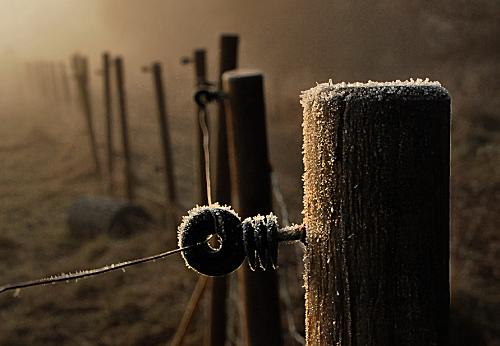
Ivar Smith-Nilsen
Onexposure Photography
_______________________
from
Cartographer At Work
Meredith Quartermain
Beside the tax authority, the macro-brewery, the flags and the ever-burning flame in Seaforth Armories Peace Park, Cartographer boards the Knight bus – Robert Knight (1829-1913) claiming fame for owning property in South Vancouver. The word roars off over the Burrard Bridge, on a route of its own: Harry Knight, a BC photographer, preferred soft-focus pictorial moodiness; John Knight, Captain RN, got his name on the Kwakwaka’wakw inlet where thousands of first nations people fished for Eulachon (he’d served in the American Revolutionary War with Vancouver’s right-hand man, Captain Broughton); The Knights of Labor in the 1880s elected Vancouver’s second mayor, lobbied for a shorter work-day, tried to stop the import of low-paid Asian workers. The word roars on through the meccano-set girders of the bridge: a feudal tenant trained for mounted combat; a man devoted to the service of a woman; a horse-head chess-piece that moves in L-shaped leaps. By sea and land we prosper, says the city motto on the bridge house – a lumberjack and a seaman hold up the city coat of arms....(more)
.....................................................
Meredith Quartermain at the Electronic Poetry Center
Vancouver Walking
Meredith Quartermain
amazon
Reviewed by Jenna Butler
12 or 20 questions: with Meredith Quartermain
rob mclennan
.....................................................
Asphyxiation
Meredith Quartermain
Doppelganger Magazine
It often happens, says Hume, that after we have lived a considerable time in any city, however at first it might be disagreeable to us, yet as we become familiar with the streets and buildings, the aversion diminishes by degrees, and at last changes into the opposite passion. For sun avenue and moon alley, fire highway and water cul-de-sac, hotel knife and flesh cloister, château dry and wet yard, public drive and household rooms, hunter boulevard and gatherer lane, piazza ploughshare and ground wynd, sacred parade and occult walk, above circus and below gardens, villa day and night asylum, cutter mansion and weaver mews, master auditorium and servant bungalow, order capital and chaos ghetto, father castle and mother kiosk.
The human condition is one of habitat. Habitude. Habit hutches. Arsonists will declare cave-ins and fold-ups, and stay at the scene mesmerized by lapsing disassemblage and abstract in-co-therence, hoping at last to lose facade. But fire-fighters bring attack hose, adapters and aerial ladders. Piss on this oxidation with master streams gushing 500 gallons a minute. Who gets to piss higher? They crank open hydrants and flake out yellow hoses to save the farm-iseum. Save the internet cafe, the Pender Grocery with its smoking ice-cream sign. Save the retro-girl fashion-boutique and the haberdashery for the finest ranch mink.
Percivals and Gallahads and Lancelots in yellow rubber chain-mail charge up on their red steeds. They lower their visors and dash their swords at magician flashover and sorcerer bankdown, driving their lances into false doors of habitation. Doors that are not doors. Doors that lead endlessly to the same frames. The knights are the frames and the frames are crusades for the doors, the video-tape of cameramen and the microphones of news crews touting avenues and lanes, boulevards and alleys. Far far away from the manholes to metropolitan unconscious.
_______________________
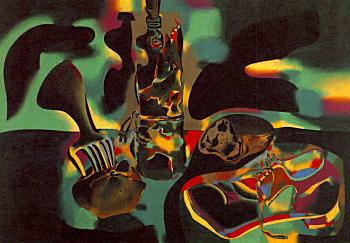
Still Life with Old Shoe
Joan Miró
1937
Angry Young Man
Joan Miró at MOMA
Peter Schjeldahl
Miró, who first came to Paris in 1920, when he was twenty-six, plainly enjoyed indulging in the slash-and-burn attitudinizing of the avant-garde, despite being essentially a plain man, of equable temperament. He had reason to think that he meant it, and not just because he was of the generation that, in the wake of the high-minded slaughter of the First World War, was disgusted with European civilization. Fustian brought out the best in him. An eventful show now at the Museum of Modern Art, “Joan Miró: Painting and Anti-Painting, 1927-1937,” explores dizzyingly rapid-fire, experimental developments in the artist’s work, influenced by Dadaism, Surrealism, and the savage materialism of the writer Georges Bataille. (In no other period was the ingenuously intuitive Miró so receptive to intellectual impetus.) With cultivated “automatist” spontaneity, he worked on raw canvas, copper, and the recently invented Masonite; employed gross materials, including sand and tar; made thoroughly abstract pictures; and hatched funky varieties of collage and assemblage, whose influence would extend to Robert Rauschenberg. It’s not his fault—or is it?—that the show leaves an impression of being distant and dated, and strangely tame....(more)
_______________________
Paying for Eight Years of Bush’s Delusions
Robert Fisk
If you can believe that bin Laden drops by a shopping mall on an American military base, then you can believe that everyone you arrest is a “terrorist”, that Arabs are “terrorists”, that they can be executed, that living “terrorists” must be tortured, that everything a tortured man says can be believed, that it is legitimate to invade sovereign states, to grab the telephone records of everyone in America. As Bob Herbert put it in The New York Times a couple of years ago, the Bush administration wanted these records “which contain crucial documentation of calls for a Chinese takeout in Terre Haute, Indiana, and birthday greetings to Grandma in Talladega, Alabama, to help in the search for Osama bin Laden”. There was no stopping Bush when it came to trampling on the US Constitution. All that was new was that he was now applying the same disrespect for liberty in America that he had shown in the rest of the world.
But how is Barack Obama going to repair the titanic damage which his vicious, lying predecessor has perpetrated around the globe and within the U.S. itself?...(more)
_______________________
My disagreement with current paradigms on the left is that the “ultraleft” (as Charles calls it) engages in do-nothing abstentionism unless it controls a process (seldom, if ever), and the “practical” left wants us to suspend our criticism of the center on behalf of some nonsense called center-left unity. So we can be either irrelevant or dishonest. Time we started learning to walk and chew gum at the same time.
We have some serious evils in our faces right now; and if we are going to confront them, then we need to list them, organize against them, and make that opposition felt in the principalities and powers. Big pharma. Big food. Big war. Big oil. Big banks. Big prisons. And the big-dick culture of me-first domination and revenge.
I have a litmus test, if anyone is interested. Let’s see if Guantanamo is closed in the first month of the new administration. Start taliking about it now.
- Stan Goff
_______________________
Blessed are the Sleazemakers
driftglass
As the fringe, minority, lunatic remnants of the Right at the King Pyrrhus of Epirus Memorial "More Conservative Than Thou" Purity Ball and Knife Fight choose up sides to carve each other to ribbons over who gets to keep Ronald Reagan's skull in their rec room for the next four years, it seemed like a good time to go down to the castle vaults and bring out this discussion of the GOP's Pretty Hate Machine from September of 2006: ......(more)
_______________________
U.S. "Constitution Free Zone"
Fact Sheet
Global Research, October 23, 2008
_______________________
Post-Identity Politics?
Larval Subjects
One of the central problems with American politics for the last thirty years is the almost complete absence of economically informed discussions. While there have, of course, been discussions of taxes, wages, and how to grow the economy, there has been very little in the way of discussions about class and class disparity.(....)
Due to the absence of any serious discussion about basic economic philosophies, American politics turned to identity politics and values issues (really two sides of the same coin), pitting one identity against another in a war of all against all. Economics– which could provide a common ground among competing identities –receded into the background, and we instead got struggles between blacks and whites, the religious against the secular, women against men, the educated elite against rural voters… Basically all of the things that characterize the so-called “culture wars”. These battles worked nicely for the capitalist class as they directed all attention to “values issues” and group identities, placing economy off limits....(more)
_______________________

The Birth of the World
1925
Joan Miró
1893-1983 333 images here
_______________________
from
Bird City
Meredith Quartermain
walrus
(....)
Erasmus said the city was a huge monastery. A city
consists in men and not in walls nor in ships (Nicias).
Towered cities please us then,/And the busy hum of men
(Milton). The Germans thought the city a social agency —
a mastermind of colonies, armies, broods and bunches;
a masterpiece of pods, flocks and litters. The city is an
immense tumultuous shipyard, said Futurists. A rigging
of rented pretenses shuffling the dreamed-of.
...(more)
_______________________
In Watermelon Sugar
Richard Brautigan
IN WATERMELON SUGAR the deeds were done and done again as my life is done in watermelon sugar. I'll tell you about it because I am here and you are distant.
Wherever you are, we must do the best we can. It is so far to travel, and we have nothing here to travel, except watermelon sugar. I hope this works out.
I live in a shack near iDEATH. I can see iDEATH out the window. It is beautiful. I can also see it with my eyes closed and touch it. Right now it is cold and turns like something in the hand of a child. I do not know what that thing could be.
There is a delicate balance in iDEATH. It suits us.
The shack is small but pleasing and comfortable as my life and made from pine, watermelon sugar and stones as just about everything here is.
Our lives we have carefully constructed from watermelon sugar and then travelled to the length of our dreams, along roads lined with pines and stones....(more)
_______________________
from
Discovery At Sea
Meredith Quartermain
To speak is to dream locations, points, situs in a written city, where the speaker is a public square for festivals and processions of dancing, disintegrating, marching palabras, parole, mots. A Piazza Navona for markets, chariot races, and the fountains of popes who taxed bread, and burned philosophers on stakes. To speak is to navigate a vast submarine forum for agones: struggles, researches, minds, wills, uprisings, reigns of terror mired in crazy inferno. To speak is to echolocate this city – to enter – dreaming, unconscious – the written pathways shaping the letters to follow. From the chuman, comes the chimp and the human. From the amniote, come the sauropsid dinosaurs and birds and the synapsid dogs, elephants, and armadillos. But there’s no going back, only forward in the writing/ walking castle so convoluted with knees, elbows, chimneys, colonnades, balconies, stairs, dumbwaiters, trundling beeping along, a great cyborg camel, so convoluted that the Human can never catalogue all the moving parts let alone figure their levers and linkages. To speak is to set out like a knight to good deeds, where the goods trade on every exchange....(more)

Remembering November
Amy Hopp Photography
_______________________
On My Way Past the Polls on Election Day
Robert Gibbons
No, I didn’t have much doubt in this case, especially compared to the doubts a poet is required to carry around ever since the first Time he animal howled, & further animal howled upon the Greek stage with Satyrs’ kicks! No, no doubt, & a great deal of faith on election day when I saw long lines of people up before dawn, camped out in the dark, waiting to vote, so I shed a tear of gladness & practiced being Free ahead of Time! Took the soundtrack to Elegy, the lovely music assembled to accompany the film by Spanish director Isabel Coixet, which includes Bach’s, Adagio from Concerto in D Minor, Early Morning Mood by Chet Baker, Beethoven’s, Diabelli Variation Op 120 No 24, & Spiegel Im Spiegel by Estonian composer, Arvo Pärt, parking down on Commercial to finish listening to it all. No meter today. No doubt, no meter, finding the last of these Free spaces there in front of the Gulf of Maine Research Institute. Free of doubt. Free space to wander from & in, on up Market to Congress past City Hall & all the local pols. Horizontally down Congress with the museum in mind as interim destination. Betsy Sholl, Maine’s Poet Laureate, appeared out of nowhere, where we could exchange poets’ views (she still had healthy doubts about the election) there in public, in the Free space of the city....(more)
_______________________
What a Long, Strange Trip It’s Been
Looking back on a surreal campaign season
Bill Ayers
Eugene Debs, the great Socialist Party leader from Terre Haute, Ind., told a group of workers in Chicago, "If I could lead you into the Promised Land, I would not do it, because someone else would come along and lead you out."
via mirabile dictu
_______________________
Obama’s coalition can be called the “coalition of the sane.” It embraces the broad forces of American democracy. Meanwhile, the Republican Party has become the party of unreason. It is a party in which it is respectable to believe that humans once traveled on saddled dinosaurs, that the American imperium can safely ignore both the economic and military limits to expansion, that Americans don’t really have to pay taxes, and that the exponential expansion of production and consumption poses no threat to the planet. The Christian right continues to grow in the United States, and even though its members were less enthused than usual about the Republicans this time, they will endure. They pose a signal threat to American democracy. If the economic crisis persists for years to come, as is likely, they will knock loudly on the door next time.(....)
Barack Obama has shown an immense capacity to confront challenges with equanimity. He'll need this as he moves from the Hollywood set to the making of the documentary film of the next four years, a different sort of saga.
-
James Laxer
_______________________
Poems for President Obama
"Poetry Off the Shelf"
Charles Bernstein, Patricia Smith and Forrest Gander offer presidential advice.
the Poetry Foundation
_______________________
Sarah Palin is the Future of Conservatism
John Brown
When conservatism makes its comeback, it is likely to look and sound a lot like Sarah Palin.(....)
as social divisions widen and opportunity declines, there will be an ever-decreasing market for the type of homely business conservatism dished along with breakfast at the local Chamber of Commerce or Rotary Club. The style of conservatism that Sarah Palin represents will be the only one that has a majoritarian future in today's America. The populist conservatism will be openly hateful, paranoid, anti-intellectual, belligerently militaristic and most significantly ideologically inconsistent and opportunistic.(....)
In the long run, the future will belong to whichever political force flies the boldest flags, stands credibly far enough from those who will be held accountable for our troubles, and curses the loudest at the coming darkness....(more)
_______________________
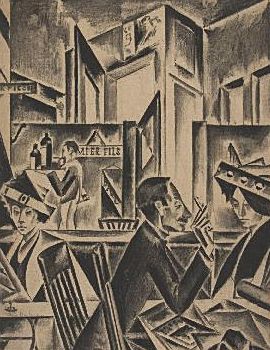
Charles Demuth
November 8, 1883 - October 23, 1935
café portrait
Preston Dickinson
1891-1930
_______________________
Ways Of Seeing
John Berger
BBC series on youtube
Ways of Seeing
the book
pdf download
_______________________
Language and Myth
Ernst Cassirer
Translated by Susanne K. Langer
pdf download
_______________________

Love, Love, Love
Homage to Getrude Stein
Charles Demuth
1928
_______________________
the Yolk blog
hosted by the graduate students at the Department of Sociology, University of Alberta
.....................................................
Eurocentrism and Culture
nOtoften
The debate about Eurocentricism simultaneously conjures complicated debates about culture. Now whether, like Geobbels, we should pull out our guns at this point is really beside the matter. As I see it, the conception of Europe as a ‘(bad) culture of universalism’ makes three assumptions in particular, each of which should be rejected outright as producing an even worse universalism, one that is antithetical to history.(....)
The face of so-called Eurocentrism serves only to let Europe off the hook. The criticism of Eurocentrism does not serve-up the world with anything better. It does not ask Europe to put its legacy to work. It does not ask Europe to do anything at all, except to hide. This is a recourse to inwardness, to identity. The criticism of Eurocentrism lets Europe continue to do what it has been doing for some time now, with little or no effect. That is, Europe looks inwards to its own constitution(s), to its own struggles that amount to little more than binding the rich parts of Europe together to exclude those nations that do not really count as European because they are poor. For Bauman, this is not the Europe that he finds in history. This is not the Europe that searches to responsibly approach the ‘ought’ of global problems, as in ‘what ought we to do?’. The critique of Eurocentrism and Europe is simultaneously a critique that pushes it further inwards, towards the ‘is’, at the expense of everyone else. This is the end of history.
“And so, to quote the trenchant Robert Kagan’s statement, ‘its time to stop pretending that Europeans and Americans share a common view of the world, or even that they occupy the same world.’ The United States, Kagan suggests, ‘remains mired in history, exercising its power in the anarchic Hobbesian world’, while Europe is already moving […] toward the Kantian world of perpetual peace, in which law, negotiation, and cooperation gain the upper hand where violence and raw force once ruled”
Yes this is a utopia. But, according to this perspective, utopia is part of Europe.
“The end of history is a myth – or an unavoidable catastrophe. And so is the end of the European adventure – of Europe as an adventure.”...(more)
_______________________
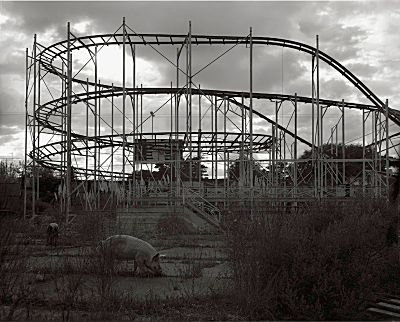
Pablo Cabado
via Heading East _______________________
The Time of Interpretation: Psychoanalysis and the Past
Jason B. Jones
Psychoanalysis, Lacan always says, has no tools at its disposal but speech. Psychoanalysis speaks to the subject of enunciation--of speaking as such--rather than the subject of the enunciated--of the particular thing that is said: "there is no unconscious except for the speaking being" (Television 5). This focus emphasizes two temporal dimensions of analysis. First, an abyss of time yawns between the beginning and ending of an utterance: in that abyss, and in no other time or place, can you find the subject. Second, by focusing on speech, Lacan emphasizes a retroaction proper to subjectivity: the end of the utterance completes the meaning of the beginning, and in some instances radically revises it. But Lacan also means that what the subject says is a bit of a ruse, a lure, a trick. The subject is always saying one thing and unknowingly meaning another. This is commonly misunderstood: it's not so much that the subject's speech is a kind of double /entendre/ in its content; rather, the point is that there's a structural double /entendre/ inherent to speech. The hysteric's symptoms and refusals amount to a kind of question: /che vuoi/? Why am I what you say that I am? No matter what the content of the speech, the message is always elsewhere, on that Other stage....(more)
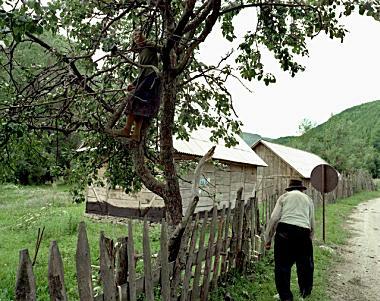
Sylvan
Clare Richardson
Seesaw Magazine
via Conscientious
_______________________
The Jungle Line
Rousseau walks on trumpet paths
Safaris to the heart of all that jazz
Through I bars and girders-through wires and pipes
The mathematic circuits of the modern nights
Through huts, through Harlem, through jails and gospel pews
Through the class on Park and the trash on Vine
Through Europe and the deep deep heart of Dixie blue
Through savage progress cuts the jungle line
(...)
IThere's a poppy wreath on a soldier's tomb
There's a poppy snake in a dressing room
Poppy poison-poppy tourniquet
It slithers away on brass like mouthpiece spit
And metal skin and ivory birds
Go steaming up to Rousseau's vines
They go steaming up to Brooklyn Bridge
Steaming, steaming, steaming up the jungle line
-
Joni Mitchell, b. November 7, 1943
_______________________
City of Orphans
John Haines
How strange to think of those streets
and vacant lots, the sandhills
where we played and dug our trenches;
the forts we built, the enemies
we conjured to aim our stick-guns at,
and then went home at evening,
to victory, to safety and sleep.
And now the vast acres of rubble,
the pitched and roofless houses,
upended stonework and sunken bridges.
The dog-packs roaming, digging,
for the one still-unclaimed victim;
the stray sniper aiming at dusk,
and in the roadside fields,
flowers that explode when picked.
The children wandering from one
burned suburb to another,
seeking that which no longer exists:
a neighborhood, a playing field,
a wading pool or a standing swing;
for a kite to fly, a ball to throw,
or just one pigeon to stone.
And through all this haunted vacancy,
from cellars and pits of sand,
come and go as on a fitful wind
such whispers, taunts and pleadings:
the scolding voices of dead parents,
the lessons of teachers no longer
standing, whose classrooms
are blown to ash and smoky air.
And far-off, unheard beyond the drone
of a single hovering aircraft –
in Paris, Zurich, Prague, or London,
the murmur of convening statesmen.
Nine Political PoemsJohn Haines archipelago
_______________________
"On the poop deck of slave galleys it is possible, at any time and place, as we know, to sing the constellations while the convicts bend over the oars and exhaust themselves in the hold; it is always possible to record the social conversation that takes place on the benches of the amphitheater while the lion is crunching the victim. And it is very hard to make any objections to the art that has known such success in the past. But things have changed somewhat, and the number of convicts and martyrs has increased amazingly over the surface of the globe. In the face of so much suffering, if art insists on being a luxury, it will also be a lie."
-
Albert Camus, "Create Dangerously" in Resistance, Rebellian & Death

Albert Camus
Nov 7 1913 - Jan 4 1960
photo - Cecel Beaton
Each generation doubtless feels called upon to reform the world. Mine knows that it will not reform it, but its task is perhaps even greater. It consists in preventing the world from destroying itself. Heir to a corrupt history, in which are mingled fallen revolutions, technology gone mad, dead gods, and worn-out ideologies, where mediocre powers can destroy all yet no longer know how to convince, where intelligence has debased itself to become the servant of hatred and oppression, this generation starting from its own negations has had to re-establish, both within and without, a little of that which constitutes the dignity of life and death. In a world threatened by disintegration, in which our grand inquisitors run the risk of establishing forever the kingdom of death, it knows that it should, in an insane race against the clock, restore among the nations a peace that is not servitude, reconcile anew labour and culture, and remake with all men the Ark of the Covenant.
-
Albert Camus' Nobel speech December 10, 1957
.....................................................

The Myth of Sysiphus
Albert Camus
_______________________

Lisboa, Portugal
1975
Josef Koudelka
Salto
_______________________
Obama's greatest achievement
Haroon Siddiqui
toronto star
For all the talk of Obama's international role, his greatest impact would be domestic, starting with the economy, which he will have to reregulate.
Americans like their wars: the war on terror, the war on drugs, the war on crime – even though none has worked, despite record amounts spent and record numbers jailed.
There's also the war Americans wage on each other through poisonous partisanship, shameless gerrymandering, and ideological and cultural polarization.
McCain was trying to fish in that cesspool with his sleazy campaign of character assassination. Republicans have done so before, successfully. This time, the toxic tactic just wouldn't work. Obama was able to float above the fray because he had already challenged several well-entrenched political narratives, not just the one on race or the one on Democrats being "soft" on security.
In reaching for the highest common factor rather than stooping to the lowest common denominator, he helped make Americans rediscover the common weal.
This is Obama's greatest triumph.
_______________________
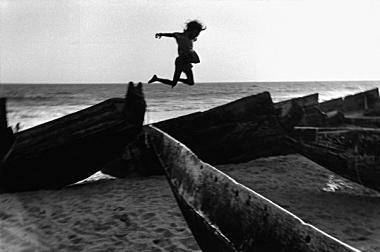
Orissa, India
1980
© Martine Franck / Magnum Photos
_______________________
A Campaign of Condescension? You Betcha!
Peter Haney
Linguistic Anthropology
Although the world will remember 2008 Presidential election as a milestone in U.S. race relations, campaign talk was also shot through with open gender conflict and sublimated class conflict, both on the levels of style and content. And in the race between style and content, style won the election handily in volley after volley of half-truths, anecdotes, and competing synecdoches. This was nowhere more noticeable than in the media circus surrounding Republican Vice-Presidential candidate Sarah Palin. ...(more)
_______________________
Palin Hoping to be Named Ambassador to Africa
Andy Borowitz
Governor Sarah Palin of Alaska has reached out to President-elect Obama's transition team to indicate her interest in being named "ambassador to the nation of Africa," the governor confirmed today.
Gov. Palin said that although she had planned to continue in her position in Anchorage, she was willing to leave the governorship "because Africa is just such a darned important country."
"I have always been very, very interested in the nation of Africa, partly because of it being located where it is," she said. "If you are standing in Africa and you look real close, you can see South Africa."
She added that she had received phone calls encouraging her to vie for the post, including one from French president Nicholas Sarkozy.
In other news from the Palin family, Bristol Palin's fiancé Levi Johnston said he was "totally stoked" about Tuesday night's election returns, calling the results "definitely a game-changer for me."
"The election of Barack Obama means different things to different people," he said. "To me, it means freedom, dude!"
_______________________

Henri Cartier-Bresson
drawing his self-portrait
Paris, France, 1992
Martine Franck
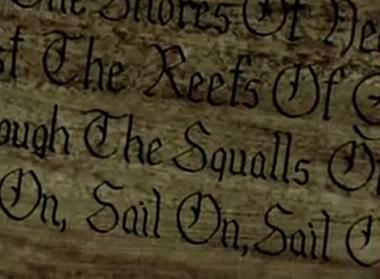
Democracy
Leonard Cohen
youtube
Sail on, sail on
O mighty Ship of State!
To the Shores of Need
Past the Reefs of Greed
Through the Squalls of Hate
Sail on, sail on, sail on, sail on.
_______________________
Obama’s Victory: A Sociological Prayer
Michael Dawson
While we are trained by vested interests to believe that democracy is a smooth-functioning, stable-state reality that has already been fully achieved and operates mainly by voting and parliamentary procedure, the actual reality is quite different. Democracy, Markoff points out, is an unending, self-expending process. Moreover, it is as much about organizing and movements as it is about rules and procedures and ballots.
Indeed, think of all the things we rightly perceive to be the fruits and blessing of democracy: votes for women, votes for victims of racist apartheid, votes for everybody of a mature age, the 8-hour work day, the right to organize unions and other political societies, environmental standards, the ending of egregious imperial wars, etc. All these things were only ever put on the public agenda and forced into the fabric of democracy by social movements. Left undisturbed by mass mobilizations and principled trouble-making, even the kindliest overseers and the fairest of mundane elections would likely have let all the overcome evils run on indefinitely. Hell, even democracy itself only won its day via fighting in the streets — think back on the American and French Revolutions! Not exactly tea parties, Boston Harbor notwithstanding.
So, as Markoff argues, the reality is that democracy moves in waves. It ebbs and flows. It surges and retreats. While Constitutions, Bills of Rights, and universal suffrage and fair elections are all necessary, they are neither sufficient nor the whole story of what democracy is and how it works. In full sociological view:
[W]e will find movements, often involving transnational components, demanding democratization; we will also find important anti-democratic movements. We will find elites advocating democratic reforms, often in response to initiatives by other states; we will find anti-democratic actions by elites a well. And we will see movements and elites interact: movements pushing elites and elites opening up opportunities for movements. When the processes come together in a great multinational convergence, the result is a wave of democratization (or antidemocracy).
...(more)
_______________________
If there is a sense of reality, there must also be a sense of possibility
Robert Musil
translated by Jerry van Beers
To pass freely through open doors, it is necessary to respect the fact that they have solid frames. This principle, by which the old professor had lived, is simply a requisite of the sense of reality. But if there is a sense of reality, and no one will doubt that it has its justifications for existing, then there must also be something we can call a sense of possibility.
Whoever has it does not say, for instance: Here this or that has happened, will happen, must happen; but he invents: Here this or that might, could, or ought to happen. If he is told that something is the way it is, he will think: Well, it could probably just as well be otherwise. So the sense of possibility could be defined outright as the ability to conceive of everything there might be just as well, and to attach no more importance to what is than to what is not. The consequences of so creative a disposition can be remarkable, and may, regrettably, often make what people admire seem wrong, and what is taboo permissible, or, also, make both a matter of indifference. Such possibilists are said to inhabit a more delicate medium, a hazy medium of mist, fantasy, daydreams, and the subjunctive mood. Children who show this tendency are dealt with firmly and warned that such persons are cranks, dreamers, weaklings, know-it-alls, or troublemakers.
Such fools are also called idealists by those who wish to praise them. But all this clearly applies only to their weak subspecies, those who cannot comprehend reality or who, in their melancholic condition, avoid it. These are people in whom the lack of a sense of reality is a real deficiency. But the possible includes not only the fantasies of people with weak nerves but also the as yet unwakened intentions of God. A possible experience or truth is not the same as an actual experience or truth minus its "reality value" but has - according to its partisans, at least - something quite divine about it, a fire, a soaring, a readiness to build and a conscious utopianism that does not shrink from reality but sees it as a project, something yet to be invented. After all, the earth is not that old, and was apparently never so ready as now to give birth to its full potential.
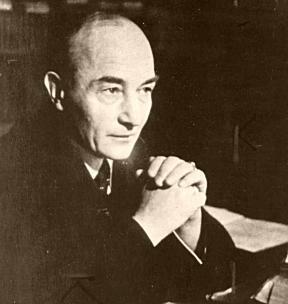
Robert Musil
Nov 6, 1880 - April 15, 1942
If someone were to discover, for instance, that under hitherto unobserved circumstances stones were able to speak, it would take only a few pages to describe and explain so earth-shattering a phenomenon. On the other hand, one can always write yet another book about positive thinking, and this is far from being of only academic interest, since it involves a method that makes it impossible ever to arrive at a clear resolution of life's most important questions. Human activities might be graded by the quantity of words required: the more words, the worse their character. All the knowledge that has led our species from wearing animal skins to people flying, complete with proofs, would fill a handful of reference books, but a bookcase the size of the earth would not suffice to hold all the rest, quite apart from the vast discussions that are conducted not with the pen but with the sword and chains. The thought suggests itself that we carry on our human business in a most irrational manner when we do not use those methods by which the exact sciences have forged ahead in such exemplary fashion.(....)
It would be a useful experiment to try to cut down to the minimum the moral expenditure (of whatever kind) that accompanies all our actions, to satisfy ourselves with being moral only in those exceptional cases where it really counts, but otherwise not to think differently from the way we do about standardizing pencils or screws. Perhaps not much good would be done that way, but some things would be done better; there would be no talent left, only genius; the washed-out prints that develop from the pallid resemblance of actions to virtues would disappear from the image of life; in their place we would have these virtues' intoxicating fusion in holiness. In short, from every ton of morality a milligram of an essence would be left over, a millionth part of which is enough to yield an enchanting joy.
-
Excerpts from Robert Musil, The Man Without Qualities
translated by Sophie Wilkins and Burton Pike
.....................................................
Robert Musil on Oswald Spengler
Progress itself is not something that unfolds in a single line. Every present period is simultaneously now and yet millennia old. This millepede moves on political, economic, cultural, biological, and countless other legs, each of which has a different tempo and rhythm. One can see this as a unified picture and elaborate it in terms of a single cause by always keeping to a central perspective, as Spengler does, but one can also find satisfaction in the exact opposite....
It is now perhaps possible to understand what I mean when I ask that such theories (insofar as they are not explicitly true or false) be treated as nothing more than experimental intellectual principles for forming the inner life, instead of--as always happens today--ascribing an emotional quality to theory in such a simple and clumsy way. What people refer to as intellectualism in the negative sense, the fashionable intellectual haste of our time, the withering of thoughts before they ripen, is caused in part by the fact that we seek depth with our thoughts and truth with our feelings without noticing that we have it backwards, and are often disappointed at not getting anywhere. Sweeping ideological attempts like Spengler's are quite beautiful, but they suffer today from the fact that far too few of the inner possibilities have had the ground prepared for them. One simply explains the World War or our collapse first by this, then by that cluster of causes; but this is deceptive. Just as fraudulent as explaining a simple physical event by a chain of causes. In reality, even in the first links of the chain of causality the causes have already flowed and dissolved beyond the scope of our vision. In the physical realm we have found an accommodation (the concept of function). In the spiritual realm we are completely helpless. Intellectuality leaves us in the lurch. But not because intellect is shallow (as if everything else had not left us in the lurch as well!) but because we have not worked at it.
-
Robert Musil, "Mind and Experience: Notes for Readers Who Have Eluded the Decline of the West," 1921 .....................................................
Subject Without Nation: Robert Musil and the History of Modern
Stefan Jonsson
Google Books
_______________________
In general, the words uttered by power are not meant to express its actions, but to disguise them
-
Eduardo Galeano, The Machine
_______________________

Bebb Oak
arboretum
Ottawa
photo - mw
_______________________
Festival of the Trees 29: Bring out your dead
hosted by Dave Bonta at via negativa
Exploring the World of Trees
treeblog interesting trees
Lumberjocks _______________________
The Complete Poetrypolitic
PoetryPolitic: A Blog in 50 Days
_______________________
Three Myths of Immigrant Writing: A View from Germany
Sasa Stanišic'
Translated from the German by Saša Stanišic'
words without borders
Migrant, immigrant, intercultural or multicultural literature today (in Germany and elsewhere) is considered a category of literature by authors who write from a perspective refracted by at least two cultures, national identities, or languages. An “immigrant background” has become a symptom of today’s world, a world suffering from ADHD and a persistent pattern of hyperactivity, as well as from impulsiveness and anger. Wars, social erosion, and even environmental issues are creating a chronic condition of permanent diaspora and migration for which no political cure is available, for it can be delivered neither in the cough syrup called fundamentalism nor in the pill called democracy.(....)
While reading works by my fellow immigrant authors, I have discovered a number of prejudices about what and how (and what not and how not) fiction written by foreigners is supposed to be and function. So, for example, my “immigrant colleagues” and I don’t appear to have so much in common as some critics and philologists wish we did, making it difficult for them to place us neatly next to one another on a bookshelf (I would argue that the colors of the novels’ covers has a greater literary relevance than our biographical backgrounds). Also, in placing special value on the enrichment of the literary language, myths are made: there is an odd urge to simplify the exoticism of style and technique which immigrant authors are “brave enough” to “experiment with,” as if this quality is a talent one has brought along from one’s homeland. Finally, the most unsettling stance is granting the immigrant worldview (if such a worldview truly exists) too much credit, based simply on having an experience of multiculturalism more profound than eating in a Thai restaurant every second Tuesday....(more)
_______________________
The emerging moral psychology
Dan Jones
Prospect
Long thought to be a topic of enquiry within the humanities, the nature of human morality is increasingly being scrutinised by the natural sciences. This shift is now beginning to provide impressive intellectual returns on investment. Philosophers, psychologists, neuroscientists, economists, primatologists and anthropologists, all borrowing liberally from each others’ insights, are putting together a novel picture of morality—a trend that University of Virginia psychologist Jonathan Haidt has described as the “new synthesis in moral psychology.” The picture emerging shows the moral sense to be the product of biologically evolved and culturally sensitive brain systems that together make up the human “moral faculty.”...(more)
_______________________
To be looked over, not to be overlooked
Jessica Smith
A preliminary list of female poets whose work is primarily, usually, or often visual, or who describe themselves as visual poets ... _______________________
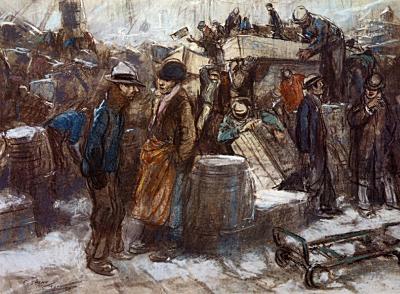
The Docks
New York City
1901
Everett Shinn
Nov 6, 1876 - May 1, 1953
_______________________
"One can't be angry with one's own time without damage to one's self."
-
Robert Musil
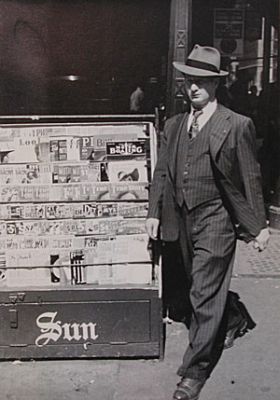
New York, N. Why?
Photographs by Rudy Burckhardt
1937–1940
via gmtPlus9 (-15)
_______________________
Mural (1999, an excerpt)
Mahmoud Darwish
(1942–2008)
Translated by Rema Hammami and John Berger
I will walk in my footsteps down the old path through the sea air
no woman will see me passing under her balcony
I have of memories only those necessary for the long journey
Days contain all they need of tomorrows
I was smaller than my eyelashes and my two dimples
So take my sleepiness
and hide me in the story of the tender evening
Hide me under one of the two date palms
and teach me poetry
So I can learn how to walk beside Homer
So I can add to the story a description of Akka
the oldest of the beautiful cities
the most beautiful of the old cities
A box of stone
where the living and dead move in the dry clay
like bees captive in a honeycomb of a hive
and each time the siege tightens
they go on a flower hunger strike
and ask the sea to indicate the emergency exit
Teach me poetry
in case a girl needs a song
for her distant beloved:
Take me to you even by force and prepare my
bed in your hands
And they walked interlaced towards the echo
as though I had married a runaway fawn to a gazelle
and opened the church door for the pigeons
Teach me poetry
She who spun the wool shirt
and waits by the door
is first to speak of the horizon and despair:
The fighter hasn’t returned and won’t return
and you are not the you I was waiting for
...(more)
_______________________
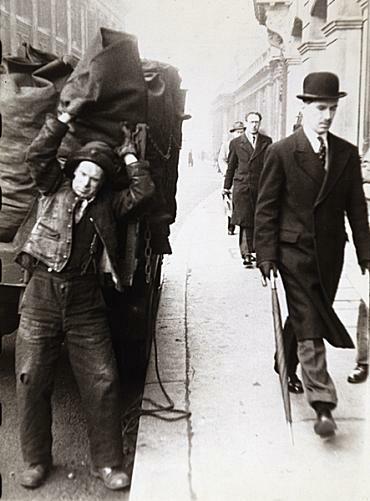
London
1951-52
Robert Frank
_______________________
The Right To The City
David Harvey
New Left Review 53, September-October 2008
We live in an era when ideals of human rights have moved centre stage both politically and ethically. A great deal of energy is expended in promoting their significance for the construction of a better world. But for the most part the concepts circulating do not fundamentally challenge hegemonic liberal and neoliberal market logics, or the dominant modes of legality and state action. We live, after all, in a world in which the rights of private property and the profit rate trump all other notions of rights. I here want to explore another type of human right, that of the right to the city.
Has the astonishing pace and scale of urbanization over the last hundred years contributed to human well-being? The city, in the words of urban sociologist Robert Park, is:
man’s most successful attempt to remake the world he lives in more after his heart’s desire. But, if the city is the world which man created, it is the world in which he is henceforth condemned to live. Thus, indirectly, and without any clear sense of the nature of his task, in making the city man has remade himself.
The question of what kind of city we want cannot be divorced from that of what kind of social ties, relationship to nature, lifestyles, technologies and aesthetic values we desire. The right to the city is far more than the individual liberty to access urban resources: it is a right to change ourselves by changing the city. It is, moreover, a common rather than an individual right since this transformation inevitably depends upon the exercise of a collective power to reshape the processes of urbanization. The freedom to make and remake our cities and ourselves is, I want to argue, one of the most precious yet most neglected of our human rights. ...(more)
Geography of Capitalism, Understanding Cities as Polities and Shifting ImperialismsDavid Harvey Theory Talks
via Critical Spatial Practice
_______________________
Postmodern Communities: The Politics Of Oscillation
Heesok Chang
Postmodern Culture_ v.4 n.1 (September, 1993)
I am thinking particularly of those thinkers (again, largely French) who write explicitly "within" a Heideggerean idiom--or rather, those writers who continue to stage a critical confrontation, an "Auseinandersetzung", with Heidegger's thought. I am thinking, for example, of Jacques Derrida's recent meditations on spirit, friendship, and today's Europe; or Phillipe Lacoue-Labarthe's exemplary work on the aesthetic assumptions informing modern national identity formation (National Socialism). And I am thinking of Jean-Luc Nancy's extended research on the finitude of our daily, nightly existence--our "being-in-common"--which has given new rigor and new impetus to thinking about what community actually means.
Nancy's appeal to rethink community could not really be characterized as nostalgic (quite the contrary). Nevertheless, something of the philosopher's "transcendental homelessness," the registration of a shared pain or loss, and therefore of a "desire", is distinctly audible in these words: "The gravest and most painful testimony of the modern world, the one that possibly involves all other testimonies to which this epoch must answer . . . is the testimony of the dissolution, the dislocation, or the conflagration of community."
This sentence could stand as a more or less appropriate epigraph for both the texts under review (more so for The Coming Community, less so for The Transparent Society). Like Nancy, both Gianni Vattimo and Giorgio Agamben address questions of our contemporaneity on a very broad scale. They too write in response to this epochal demand: not to "be at home everywhere," but to free the very idea of "home," of a certain belonging, from the planetary administration of techno-economic forces. And like Nancy, both authors draw considerably on Heidegger to articulate not only their diagnoses of our (post)modernity, but also their prescriptions for rethinking our being-in-the-world....(more)
via Matt Christie
_______________________
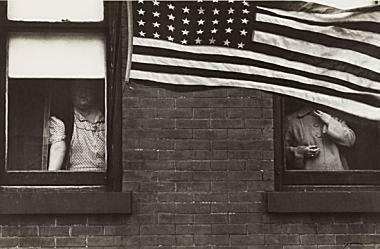
Parade
Hoboken, New Jersey
Robert Frank
1955
_______________________
The Whoppers of 2008
The Whoppers of 2008 -- The Sequel
FactCheck
_______________________
Understanding the Economic Crisis
Institute for Policy Studies reports
via Thivai Abhor
_______________________
Words Without Borders - Nov. 2008
the enigma of arrival: immigration
_______________________
Borders Are For Sissies
The Bush administration has successfully linked the occupations of Iraq and Afghanistan to their so-called "war on terror." By doing so, they can do whatever they want.
Ron Jacobs
Despite the clear disregard for civilian life inherent in these raids whether airborne or otherwise, the aspect of these raids that is potentially the most dangerous is the blatant disregard for national borders shown by the Pentagon. This isn’t a band of terrorists that is crossing national borders to kill and destroy. It is the largest military in the world–the military of a nation that considers its borders inviolable. Yet, it seems to have little regard for those of other nations, allies or foes. Indeed, an anonymous US official was quoted in a Washington Post article on October 28, 2008 “You have to clean up the global threat that is in your back yard, and if you won’t do that, we are left with no choice but to take these matters into our hands.” By global threat, the official obviously meant a threat to the designs of Washington for the globe, not a threat against the planet itself. As most readers are well aware, Washington often confuses its security with that of the world and, by doing so, places the entire planet at even greater risk every time it acts to preserve that security....(more)
_______________________

Robert Frank
in his house in Nova Scotia
1969-1971
photograph by Walker Evans
Robert Frank
Walker Evans
_______________________
Kick the Stones: [PDF]
Everyday Hegemony, Empire, and Disillusionment
A Collection of Political Poetry Musings
Jennifer C. Wolfe
a BlazeVox e-book
Terror
We are terrified of strangers taking
Tourist photographs, we are terrified
Of unattended bags and vehicles, we are
Terrified of individuals with swarthy faces,
Who kneel to pray in mosques, we are
Terrified of elevated rainbow colored
Terror alert levels, we are terrified of
Arabic head scarves, we are terrified of
Middle Eastern names and accents, we are
Terrified of anthrax spores traveling along
With our mailed letters and packages, we are
Terrified of passenger jets, we are terrified
Interstate bridges will fall from safety
Negligence, we are terrified of ice storms,
Of swirling tornadoes, and massive
Hurricanes that leave entire cities desolate,
Years after promised rebuilding, we are terrified
Of a military draft to supplant endless wars,
We are terrified those not of our class will
Move into our neighborhoods, we are
Terrified our children’s toys are painted
In lead, we are terrified our food crops are
Contaminated with E-coli, we are terrified our
Ailing parents will need us to take care of them,
We are terrified the NSA will listen in on our
Telephone lines or spy on our e-mail, we are
Terrified our library check outs might
Identify us as being unpatriotic, we are
Terrified the CIA will render us to
Hidden prison networks, chained within
Gulfstream corporate jets, we are
Terrified we will be harshly interrogated,
We are Terrified we will be labeled an
Enemy combatant and carted off to Gitmo:
What we should be terrified of, above all,
Is our complacency with being terrified?
_______________________
Another Naming, a Living Animal: Blanchot's Community
Andrew Benjamin
SubStance #117
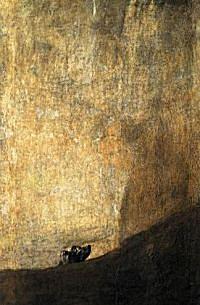 The dog appears. Its head is above the line. Is the dog slipping back? Its head is on the line. Is it submerging again, tasting death as the admixture of fear and the quicksand that will eventually end the ebb and flow of life? Is it scrambling futilely up a bank that no longer holds? The dog is being defined by its eventual death. While still allowing for the severity of the animal’s predicament, its appearance may be precisely the ebb and flow, thus a continuity of life not structured by death but by having-to-exist. Within what then does the dog appear? The question has force precisely because it has an exigency that cannot be escaped since neither answer nor direct resolution is at hand. The question endures. Once allowed, the question repositions the line. No longer mere appearance, the line is neither the sign of a simple division nor is it able to sustain a simple either/or. Death cannot be equated with the dark. Equally, the light cannot be reduced to the life that may be escaping. (Though it should not be forgotten that Goya’s work belongs to the so-called Black Paintings.) The dog’s head interrupts the line. As a result, what is opened is a site. Perhaps, to use a word that will play an important role in the analysis to come, what emerges is an écart that refuses simple and symmetrical oppositions.(....) The dog appears. Its head is above the line. Is the dog slipping back? Its head is on the line. Is it submerging again, tasting death as the admixture of fear and the quicksand that will eventually end the ebb and flow of life? Is it scrambling futilely up a bank that no longer holds? The dog is being defined by its eventual death. While still allowing for the severity of the animal’s predicament, its appearance may be precisely the ebb and flow, thus a continuity of life not structured by death but by having-to-exist. Within what then does the dog appear? The question has force precisely because it has an exigency that cannot be escaped since neither answer nor direct resolution is at hand. The question endures. Once allowed, the question repositions the line. No longer mere appearance, the line is neither the sign of a simple division nor is it able to sustain a simple either/or. Death cannot be equated with the dark. Equally, the light cannot be reduced to the life that may be escaping. (Though it should not be forgotten that Goya’s work belongs to the so-called Black Paintings.) The dog’s head interrupts the line. As a result, what is opened is a site. Perhaps, to use a word that will play an important role in the analysis to come, what emerges is an écart that refuses simple and symmetrical oppositions.(....)
Writing, bound up with the move to literary language, involves a conception of work that resists the automatic directionality inherent in the logic of negation and equally in the predication of an already determined sense of measure. And yet, measure and production are occurring. At work here—a work signalled by the co-presence of “working” (travaillant) and “unworking” (désoeuvrant)—is a specific economy. The “Unique” as the destruction of nature reinforces the need to understand that determination as predicated on that economy, and therefore as involving a form of production. Prior to addressing this economy, the question that has to be taken up concerns the relationship that the mode of human being identified in Blanchot’s writings on Sade may have to the between and with it to the us.
If the question arising from the interconnection of between and the us can be asked with stark simplicity, then it is the question of community.
mediafire pdf link
_______________________
Poetry and Stupidity Part 2
K. Silem Mohammad
My earlier post on stupidity, magic, and poetry was meant in large part as a flippant provocation, an indulgence to which I am at times lamentably prone. But like many such provocations, it lends itself to subsequent redaction. One form of said redaction occurs, inevitably, in the shape of a fourfold categorization, in this case, of types of application of language with the objective of making something come into being, or at least swim into our ken. Let's say: 1. Philosophy, 2. Poetry, 3. Religion, 4. Magic....(more)
Poetry and Stupidity (part 1)
_______________________
E·ratio 10 · 2008
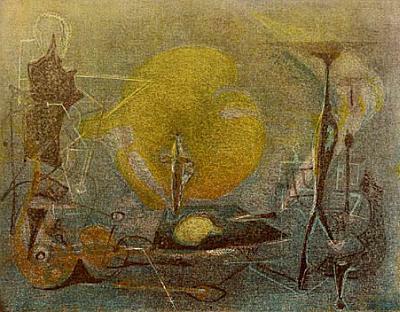
Dawn Dance
1946
Boris Margo
via Ordinary finds
_______________________
De Profundis
Georg Trakl
February 3, 1887 - November 3, 1914
translated by James Wright and Robert Bly
It is a stubble field, where a black rain is falling.
It is a brown tree, that stands alone.
It is a hissing wind, that encircles empty houses.
How melancholy the evening is.
A while later,
The soft orphan garners the sparse ears of corn.
Her eyes graze, round and golden, in the twilight
And her womb awaits the heavenly bridegroom.
On the way home
The shepherd found the sweet body
Decayed in a bush of thorns.
I am a shadow far from darkening villages.
I drank the silence of God
Out of the stream in the trees.
Cold metal walks on my forehead.
Spiders search for my heart.
It is a light that goes out in my mouth.
At night, I found myself on a pasture,
Covered with rubbish and the dust of stars.
In a hazel thicket
Angels of crystal rang out once more.
Twenty Poems of Georg Trakl [PDF] Translated and Chosen James Wright and Robert Bly
Index of all literary texts of Georg Trakl
translations by Jim Doss and Werner Schmitt
this is a major resource - mw
_______________________
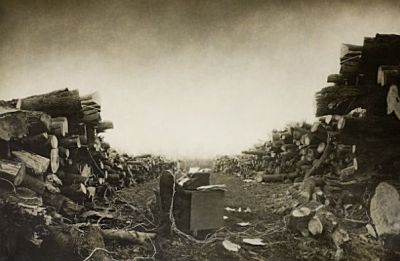
Robert and Shana ParkeHarrison
_______________________
No Currency Left to Buy the Big Lies
John Cusack
The final irony of the free-market Darwinist model is instead of the strongest and best surviving, it's really the weakest and the worst. From a moral and spiritual point of view this is hardly in doubt. See George Bush. The gospel he purports to serve tells us this but perhaps he saw Christ as a conqueror. I've always doubted men who call themselves Christians who live by the law of the jungle. The gospels, the Koran and the Torah make no bones about it: wealth is not strength; power often represents not the brightest and the best but the weakest and worst. The beast in the Book of Revelation is not a horn-rimmed devil but Rome. Empire. Any empire. Every empire.
As Bush leaves office, the real truth is this: the new economies of the world disprove everything he ever said. Apparently that doesn't matter.
Neoconservatives will lie in the weeds and gather forces, the same players in a revolving door. They want back in and if history has proved anything, worshiping the markets is not enough. We must actually kill to feed them. A horrible cross-pollination of fundamentalism, dementia and market fever has turned America into a willing enabler of corporate cannibalism. Nothing else to call it when murder is seen as a legitimate extension of economic policy. Preemptive war is not only justified but openly referred to as a market opportunity. The strong do what they can and the weak suffer what they must. As we look out at the wreckage -- world economies collapsing, nationalized banks and a complete loss of trust -- we can see the hypocrisy as all are revealed as true socialists on the way down, crying in their scotch and Ambien as they run to the state for cover.(....) The real challenge is to erase the delusion that greed equals freedom and prosperity, let alone the hideous lie that it somehow spreads justice. Amazingly, we are asked to listen to this gibberish in political life no matter how high the bile rises.
Many believe economies must serve humanity and not the other way around. Economies must make a moral connection to the republic. Brace yourselves free marketers: the quality of economic and human transactions will have to take priority over money. Faith and hope have to manifest in the social transactions we make.
A new social contract could be coming based on a real currency my friend Kevin McCabe calls the currency of grace. It is a currency of economic fairness and institutionalizing concepts of shared responsibility; a currency based on the gold standard that every human has value and should be awarded respect and opportunity, the dignity that comes from human beings protecting each other from the values and ideals of a Darwinist world. Its spirit is in Keynesian economics, a mixed economy with regulated markets and social spending. In the new era, we must remove fundamentalist right wing economists as the high priests and kings. Their ideology will stay dead only if we remain vigilant and call things what they are. It's a battle for the idea of America and it's just beginning if Senator Obama becomes president....(more)
_______________________
Paulson's Swindle Revealed
William Greider
The swindle of American taxpayers is proceeding more or less in broad daylight, as the unwitting voters are preoccupied with the national election. Treasury Secretary Hank Paulson agreed to invest $125 billion in the nine largest banks, including $10 billion for Goldman Sachs, his old firm. But, if you look more closely at Paulson's transaction, the taxpayers were taken for a ride - a very expensive ride. They paid $125 billion for bank stock that a private investor could purchase for $62.5 billion. That means half of the public's money was a straight-out gift to Wall Street, for which taxpayers got nothing in return. ...(more)
_______________________
Oddly enough, the movie that may offer the clearest insight into the influence of George W. Bush over Hollywood may be Oliver Stone's W. Sadly, not because it's terribly good – nor is it terribly bad – but because of its sheer redundancy.
Arriving in the final weeks of President Bush's eight-year dominion, this portrait of a largely befuddled born-again former frat boy (played with an admirable lack of condescension by Josh Brolin) offers practically nothing in terms of insight or revelation. Worse, it never comes close to outflanking the forehead-slapping outrageousness of the real thing.
That may be the Bush administration's most impressive pop cultural achievement: it made fiction irrelevant.
- Geoff Pevere
_______________________
The Ethical Economy
Adam Arvidsson & Nicolai Peitersen
from the introduction [pdf]
This book suggests that we are facing an epochal economic and social shift, perhaps of
an importance unsurpassed since the bourgeois revolution that gave birth to the capitalist
economy that we have today. The next economy will be an ethical economy where value
is no longer based on labour as in the capitalist economy (nor on land as in the feudal
economy that preceded it), but on the ability to construct ethically significant social
relations. This is no utopia: the ethical economy is already here, in brand management, in
advanced forms of knowledge work, on financial markets, and in the expanding range of
autonomous forms of social production- ranging from P2P software, via fan
communities to alternative forms of agriculture and food distribution- that have evolved
around new information and communication technologies. And its impact is set to grow
with the further diffusion and evolution of those technologies. This book offers a first
coherent theory of the ethical economy, examining its origins, its present dynamics and
its future potential. It draws out the implications of this epochal shift for business,
politics and society.
excerpt from the Ethical EconomyAdam Arvidsson & Nicolai Peitersen
...today the assets are different form those of the 1920s. The most important assets in todays financial crack - mortgage-backed securities, credit card debt and many intangibles, like brand values are essentially securitizations of what we could call ‘life conduct’. The value of a mortgage or of credit card debt depends on the life conduct of the borrower. The value of a brand depends on the life conduct of consumers (this is actually what is measured in brand valuation schemes) and of the ethical conduct of the company that owns the brand; the value of a real estate market depends on the life conduct of the inhabitants of a neighborhood or a city- after all this is what ‘creative city’ policies are all about. And to a large extent the productivity of a knowledge intensive company is about the life-conduct of its employees. So in many ways current financial markets build on the direct securitization of life-conduct, of ethically coherent forms of life. Swiss-Italian economist Christian Marazzi pointed this out long ago. Looking at the New York financial crisis of 1929, for many the origin of the neoliberal era, he showed how the privatization of city debt (through city bonds sold to the middle classes) gave a direct economic importance to the life-conduct of the poor. This, he argues, was the origin of the neoliberal era with its combination of freedom of private property and discipline for the propertyless.
So the present crisis was preceded by a boom that built essentially on the securitization of life conduct, where the ethics of everyday life became a direct foundation of value. Like in the 1920s, however, the crisis resulted form a lack of rational measurements of the value of such forms of life conduct. What kinds of lessons can we draw form this?...(more)
Actics Blog
aligning action and ethics
thanks to Phil Cubeta at the Gift Hub
_______________________
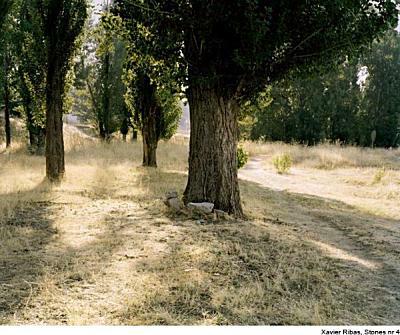
Stones
Xavier Ribas
Made distraught by the storm and a promise he had made in life to his recently deceased wife, the man curses the road that runs right by his doorstep. He sees the road as a threat to the universe of the house, of domesticity and intimacy. The road shall bring to his doorstep the unknown and the undesired, and at the same time carry away all that the house keeps hidden, of life as well as death: "But it seems hard that a man in his need could be so flounted by a road", exclaims this man locked up in himself, for whom the 'long ways' of the road and everything that needs to be always moving from one place to another is in conflict with the verticality and rooting of trees, of the house and of man (William Faulkner As I Lay Dying).
Gaston Bachelard writes about the poetic image offered by the house's intimate spaces, but he also writes about all spaces that invite us to come out of ourselves, about provisional refuges and occasional shelters. Images of intimacy are not just the product of our dreams of rest, writes Bachelard, but also of dreams of the man that walks, his roads, his crossroads, his roadside benches: all really inhabited space bears the essence of the notion of home. If the flowers by the side of the road mark a place of separation, loss and passage, the tree, the stone and the shadow, in contrast, represents a meeting place, a place of recollection, of abiding.
- Xavier Ribas
_______________________
The Museum of Stones
Carolyn Forché
This is your museum of stones, assembled in matchbox and tin,
collected from roadside, culvert, and viaduct,
battlefield, threshing floor, basilica, abattoir,
stones loosened by tanks in the streets
of a city whose earliest map was drawn in ink on linen,
schoolyard stones in the hand of a corpse,
pebble from Apollinaire’s oui,
stone of the mind within us
carried from one silence to another,
stone of cromlech and cairn, schist and shale, hornblende,
agate, marble, millstones, and ruins of choirs and shipyards,
chalk, marl, and mudstone from temples and tombs,
stone from the silvery grass near the scaffold,
stone from the tunnel lined with bones,
lava of the city’s entombment,
chipped from lighthouse, cell wall, scriptorium,
paving stones from the hands of those who rose against the army,
stones where the bells had fallen, where the bridges were blown,
those that had flown through windows and weighted petitions,
feldspar, rose quartz, slate, blueschist, gneiss, and chert,
fragments of an abbey at dusk, sandstone toe
of a Buddha mortared at Bamiyan,
stone from the hill of three crosses and a crypt,
from a chimney where storks cried like human children,
stones newly fallen from stars, a stillness of stones, a heart,
...(more) _______________________
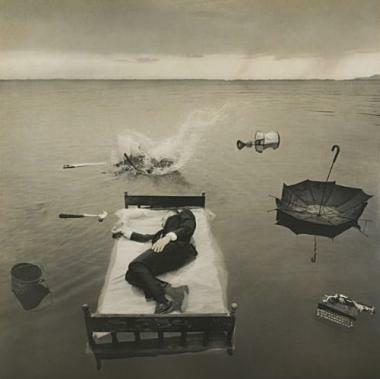
Robert and Shana ParkeHarrison
_______________________
Dream and Derangement
Georg Trakl
In the evening the father became an old man; in dark rooms the countenance of the mother petrified and the curse of the degenerated race weighed on the boy. Sometimes he remembered his childhood, fulfilled with sickness, terror and eclipse, secret games in the star-garden, or feeding the rats in the dusking courtyard. From the blue mirror the narrow figure of the sister stepped and he fell as if dead into darkness. At night his mouth burst open like a red fruit and stars gleamed over his speechless grief. His dreams fulfilled the ancient house of the fathers. In the evening he liked to walk over the decayed cemetery, or he watched the corpses in the dusking crypts, the green stains of rot on their beautiful hands. At the gate of the monastery he asked for a piece of bread; the shadow of a black horse jumped out of darkness and frightened him....(more)
_______________________
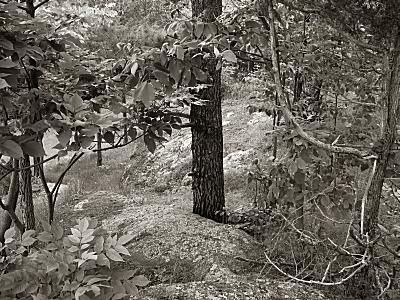
photo - mw

Constantine Manos
_______________________
A Sentence About Tyranny
Gyula Illyés
Translated by George Szirtes
Where tyranny exists
that tyranny exists
not only in the barrel of the gun
not only in the cells of a prison
not just in the interrogation block
or the small hours of the clock
the guard's bark and his fists
the tyranny exists
not just in the billowing black fetor
of the closing speech of the prosecutor,
in the "justified use of force"
the prisoners' dull morse
not merely in the cool postscript
of the expected verdict
there's tyranny
not just in the crisp military
order to "Stand!" and the numb
instruction "Fire!", the roll of the drum,
in the last twitch
of the corpse in the ditch
(....)
tyranny supplies
the standing ovation, the loud
hurrahs and chanting of the crowd
at the conference, the songs
of tyranny, the breasts
that tyranny infests,
the loud unflagging
noise of rhythmic clapping,
at the opera, in trumpet cry,
in the uproarious lie
of grandiose statues, of colours,
in galleries,
in the frame and the wash,
in the very brush,
not just in the neat snarl
of the midnight car
as it waits
outside the gates
tyranny permeates
all manners and all states,
its omnipresent eyes more steady
than those of old Nobodaddy,
there's tyranny
in the nursery
in father's advice, in his guile,
in your mother's smile
in the child's answer
to the perfect stranger;
...(more)
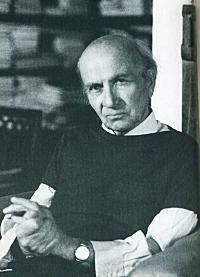
Gyula Illyés
(November 2, 1902 – April 15, 1983)
_______________________
Today I Like Life Much Less…
Cesar Vallejo
Translated by Rachel Galvin
Today I like life much less,
but I always like to live: as I was saying.
I nearly touched the part of my whole and restrained myself
with a pull at my tongue behind my word.
Today I stroke my chin while pulling back
and in these temporary trousers I tell myself:
So much life and never!
So many years and always my weeks!...
My parents buried with their stone
and their heavy-hearted heave that has not ended;
full-length brothers, my brothers,
and well, finally, my béing standing and in a vest.
I like life enormously,
but, of course,
with my dear death and my coffee
and seeing the leafy chestnut trees of Paris
and saying:
It’s an eye, this, that one; a forehead, this, that one…and repeating:
So much life and never does the tune fail me!
So many years and forever, ever, ever!
...(more)
Cesar VallejoOctopus Magazine #10
_______________________
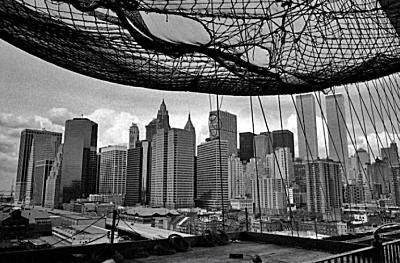
Safety Net
Pedro Meyer
_______________________
“burnished Day,
Conch Of The Voice…”
Odysseus Elytis
November 2, 1911 - March 18, 1996
Translation: Edmund Keeley and Philip Sherrard
Burnished day, conch of the voice that fashioned me
Naked, to step through my perpetual Sundays
Between the shores’ cries of welcome,
Let your wind, known for the first time, blow freely
Unfold a lawn of tenderness
Where the sun can roll his head
Can enflame the poppies with his kiss
Poppies nourished by men so fine
That the sole mark on their bare chests
Is the blood of defiance that annuls sorrow
And attains the remembrance of liberty.
I spoke of love, of the rose’s health, of the ray
That by itself goes straight to the heart,
Of Greece that steps so surely on the sea
Greece that carries me always
Among naked snow-crowned mountains.
I give my hand to justice
Diaphanous fountain, sublimest spring,
My sky is deep and changeless
All I love is incessantly reborn
All I love is always at its beginning.
Greece - Poetry International Web
_______________________

Burroughs and Kerouac
1953
Young Bull and Old Jack
Andrew Martin reviews
And the Hippos Were Boiled in their Tanks by Jack Kerouac and William S. Burroughs (Grove Press, 2008)
And the Hippos Were Boiled in their Tanks is a novel that Kerouac wrote with Burroughs, apparently in the first months of 1945. Neither of them had published anything when they started writing the book, and it did not serve as their breakthrough—it was rejected by Simon and Schuster. Reading it now, this is not surprising. It is an astoundingly clumsy document of two writers who have not yet found their voices. Both try on some variation of a “hard-boiled” style, with Burroughs trying for an early Hemingway-style flatness and Kerouac allowing himself a bit more chattiness and color. The book is as charming as it is awkward, and it is very charming.
For the plot of the novel, Kerouac and Burroughs fictionalized the events leading up to the murder of David Kammerer by Lucien Carr in August of 1944. ...(more)
Open Letters Monthly - November 2008_______________________
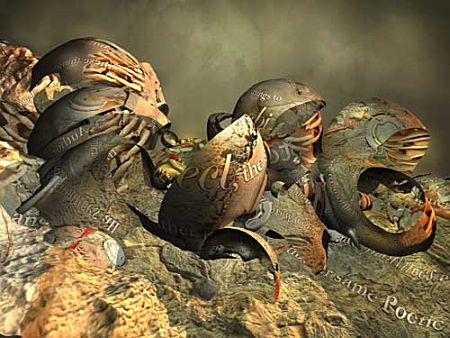
The Disremembered Glossolalist
Peter Ciccariello
Visual Poetry Today
Geof Huth
Visual poetry provides a reading challenge to most readers, because the methods of interpreting information vary widely. Some poems read linearly, just as a traditional poem would. Many others utilize individual words outside of any traditional syntax, requiring the reader to find connections that are suggested only spatially. Most contemporary visual poems fragment words into pieces, forcing the reader to delve ever more deeply into the text to sift meaning out of an often hectic mise-en-page. One important notion to keep in mind while reading visual poetry is that it makes sense via more than just the text itself. Color, shape, and arrangement-including proximity to, and integration with, images-are important elements in the meaning of any visual poem.
We are living through what might be the greatest age of visual poetry, in a time when the methods of production and distribution are such that the form can prosper without the need for extensive capital. A convergence of factors—which include the Internet, print-on-demand publishing, and an increasing interest in the visual and textual—has allowed this hybrid form to flourish across the planet. Visual poetry used to be confined to mimeographed or photocopied magazines that rarely existed in editions greater than one hundred. Today, many venues on the Internet, including poetry e-zines, regularly publish visual poetry, making access effectively free, and distribution essentially infinite.
more, including a portfolio of twelve works
via Squandermania and other foibles
invisible notes
Peter Ciccariello
_______________________
John Latta's Trouvailles Malarkey & Guffs
damn the caesars
Each posting makes for a richly sedimented, wonderfully disorienting conjunction of texts. The poems that appear in most of the postings are part of an ongoing series called The Everyday — a series that seems to emerge from the close attention Latta's given to Michel de Certeau's notion of the everyday, a walking through the everyday that allows him to absorb the cultural materials of the everyday. Latta's poems, as textual instantiations of everyday life, are a moving enactment of de Certeau's concept: "Everyday life invents itself by poaching in countless ways on the property of others." We find this poaching in Latta's poems, each poem a mound of fragments addressing the spaces of relation that bind the otherwise disparate fragments of a civilization together....(more)
Isola di Rifiuti
_______________________
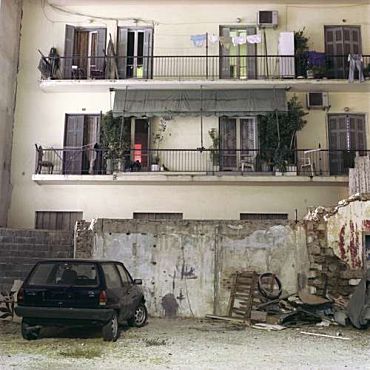
Angela Svoronou
Contemporary Greek Photography: Nocturne
Luminous-Lint
Plep - NY
_______________________
Drill baby drill!
Richard Carlson
ctheory....
drill baby drill
The suits down at the homes office are too busy to care for casualties
anyway, they've other fish to fry, long ago they shifted
attention to natural gas, a swapping out of petrochemicals,
because when the current resources are gone,
when these wells are tapped out,
other mineral dreams lay on the horizon,
next up are perhaps a few hundred trillion cubic ft
of natural gas reserves; streamed capitalism in its most elemental form,
streaming methane molecules,
to be sped along through chilled pressurized pipeline stretching
from the North Slope to old sweet home, port of Chicago,
and from there on to the suburbs,
this project has an expected thirty-five year life cycle,
it's to be the largest ever privately funded project in history
when BP and CP signed the deal,
Governor Palin declared: “It’s a good day,”
drill baby drill
They will have to make due with this project until the K street boys
build political bridges to ANWAR; building bridges to nowhere
of course, are easily finessed and funded up here
but ANWAR is hardly nowhere, or Erehwon,
it is not Utopia except for some birthing caribou,
whose ancient migrations do not fit neatly into
the ten thousand market calculations involved
in the crack spread and futures price of the oil hedging market;
migratory birds, caribou herds, wolf packs, and polar bears,
cannot provide surplus value equivalent
to ten or twenty billion barrels of crude
...(more)
_______________________
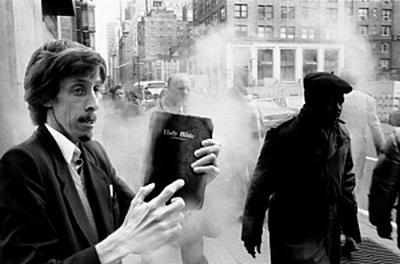
Religious Imagery - Culminating Moments of Existence
Pedro Meyer
curated by Elizabeth Ferrer
_______________________
The Language of Life and Death
Studs Terkel, the author of Will the Circle Be Unbroken?, talks about hope, September 11, and why Americans must think anew
The Atlantic, October 12, 2001
Do you think what happened on September 11 is going to change the way we think or talk about death?
Well, I hope it does this: I hope it makes us feel the value of human life anywhere in the world. We have never been attacked this way. Elsewhere in the world, everybody has. We have been the "exceptional people." I hope that when we see that Vietnam shot of that naked little girl, terrified, running along the railroad tracks, I hope we realize the fact that she's our little girl. I hope that when we hear about this Iraqi kid as we bomb Iraq—we don't get Saddam Hussein, this brute; we do get women and kids—I hope we look at the Iraqi kid as our kid. That is what I hope, and that is what Einstein hoped, too—I always love to quote Einstein, because no one dares contradict me. Einstein, my God, he's responsible for the bomb. It's ironic, he's the only one who could convince President Roosevelt to do the stuff at Los Alamos. But Einstein was the great mind of the twentieth century and the great heart of that century. And he said, Everything in the world has changed since the atom was split except one thing: the way we think. We must think anew. And that's what Tom Paine had in mind 210 years ago, in 1791. He wrote a piece about that very thing: there's something new, a new society, this American society—never in the world has there been anything like this. Not only free citizens but thinking citizens. This could be the example for the whole world! We must think anew. We have to realize that we are no longer isolated in the world. ...(more)
_______________________
SPECIAL COVERAGE: Touch-Screen Vote-Flipping 2008
The BRAD BLOG
...it is strictly 100% impossible to verify that any vote ever cast on such a Direct Recording Electronic (DRE, usually touch-screen) voting machine for any candidate or initiative on the ballot during any election, has ever been recorded accurately, as per any voter's intent.
DRE voting -- with or without the so-called "voter verifiable paper audit trail" (VVPAT), that are created by some of these machines -- is strictly, 100% faith-based voting. Period. (....)
What to do if it happens to you:
* Call poll supervisors to observe the problem.
* Fill out a problem report.
* Refuse to vote on that machine.
* Request that the machine be taken out of service.
* Get a serial number of the machine if possible (may be difficult in many cases).
* Tell other voters in line which machine it was and that they should NOT vote on that machine!
* Report it to county/town election office.
* Report it to the Secretary of State.
* Call local reporters and tell them the story.
* Call voter problem hotlines (eg. 866-MYVOTE1 and 866-OUR-VOTE) and report it.
* Contact bloggers and Election Integrity websites.
* Raise holy hell.
...(more)

“The Art of Storytelling: Pedro
Meyer’s I Photograph to Remember”
Jonathan Green the Heresies project
a Retrospective by Pedro Meyer
(a massive collection)
_______________________
A Vietnam Vet on Joe the Plumber
Reflections of an Average Joe
William P. O'connor
My opinions don’t warrant national attention like Joe the plumber, but I consider myself fortunate. Forty years before I was born, progressive labor leaders fought to get children out of factories and into schools. Civil Service jobs, like firefighter, were given by political appointment and offered no competitive exams for promotion. New York labor marches as late as 1914 had children carrying signs that read, “Support the 72 hour week” and “Please let us play on Sunday.” Decent working conditions, minimum wage and fair trade are all benefits demanded by the many from the few. Before organized labor, employers denied health care, pensions, vacations, or other benefits. Giants of labor sacrificed their lives to get children off factory production lines, and their martyrdom should be neither taken for granted nor forgotten.
Sit in the day room or kitchen of a New York City fire house – which I proudly did for 23 years -- and you’ll hear rants about liberals screwing up this country. The God damn left wing, bleeding heart socialists don’t care about the working man. They give our hard earned taxes to illegal immigrants, and minorities on welfare. Despite statistics showing more whites on welfare than minorities, false perceptions like this pervade blue collar America. The corporate media has persuaded Middle America that liberal is a prefix to be followed immediately by bastard. It behooves those in control to keep workers divided; pitting one class of sufferers against the other is a tenet older than labor negotiation itself. To paraphrase Steinbeck: keep them apart, make them hate and fear each other -- this is how to turn we to I. ...(more)
_______________________
Joe discusses the election and poor whites
The American News Project traveled to Winchester, Virginia to get Joe Bageant on video, talking about his book Deer Hunting with Jesus, the upcoming election, corporate control of damn near everything, and why poor people without medical insurance are opposed to expanded access to health care. On its web site introduction, the American News Project described Joe's book as "one of the most prescient pieces of analysis about American politics and culture in this election year."
The seven-minute video closes with 20 seconds of Joe picking his mandolin and singing.
_______________________
'Curiosity did not kill this cat'

Studs Terkel
May 16, 1912 - October 31, 2008
Cultural Heroes - Studs Terkel
Time Out Chicago
Rocking the Boat
15 minute tailer, Studs Terkel, Hazel Wolf, Stetson Kennedy and others talk about their activism in the last century. SYNOPSIS ROCKING THE BOAT: STUDS TERKEL'S 20TH CENTURY, is an educational DVD which began as a PBS documentary for KCTS, Seattle in 1998. It is adapted, with permission, from Studs Terkel’s COMING OF AGE. ROCKING THE BOAT takes a close look at the social progress achieved during the last century and how it was achieved, as seen through the eyes of 95 -year-old oral historian Studs Terkel (who was 85 years young when the production was filmed) and nearly a dozen of his contemporaries. There will be an accompanying Web site in addition to this Google Video work-in-progress.
Conversations with History: Studs Terkel
55 min. youtube
Conversations with History
Studs Terkel Interview, full text
_______________________
Words upon the Opening of a Thought
Geof Huth
otoliths
...
In the shadowy dusk, I swallow a swarm of gnats surrounding me like
the night’s cloud, something like regret when measured against the opportunity
a life affords. Each gnat, I see, is a period, the end of a sentence I have just spoken,
conclusion to each sentence of the day, my words reduced to their essentials—
the simple number of strings of knotted words, the cardinal number of quipus I
dutifully carried through the day, half for myself, half for the dead minions who
came before me and said, Take my words forth. ...........(more)
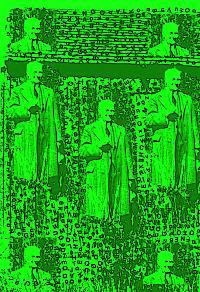
otoliths - eleven
_______________________
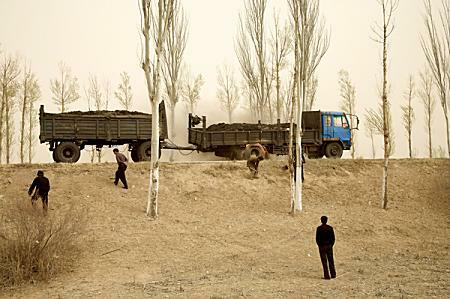 Bayannur Region
Inner Mongolia
Benoit Aquin
The Chinese Dust Bowl
Benoit Aquin (photographer) and Patrick Alleyn (writer)
walrus
Benoit Aquin wins $100K prize
Prix Pictet
The World's Premier Photographic Award in Sustainability
_______________________
Turning the Tide of Ethnic Cleansing in America's Cities
Glen Ford
The demise of investment banking as a central tool of capitalist planning means the rich have at least temporarily lost the ability to remake the cities as they see fit. While some gentrification projects are on hold, due to the death or ill health of the investment bankers at the heart of most "Black removal" schemes, tenant and community forces must seize the time to devise their own plans for rational ways of living in post-meltdown urban America.
_______________________
Wall Street Bonus Madness
Stanley Heller
Merrill Lynch will hand out $6.7 billion in bonuses even though it has lost money for five straight quarters and saw its stock fall in value by 70%. (The company also sold itself off to the Bank of America.) $13 billion is being set aside at Goldman Sachs and Morgan Stanley. Even some employees at Lehman Brothers will be given big fat end of the year envelopes even though the company has gone bankrupt.
I am deeply disappointed that a number of financial institutions are distorting the legislation,'' Frank, a Massachusetts Democrat, said in a statement today. `
`Any use of these funds for any purpose other than lending -- for bonuses, for severance pay, for dividends, for acquisitions of other institutions, etc. -- is a violation of the terms of the act.''
-
Barney Frank
.....................................................
A Thousand Plateaus: Capitalism and Schizophrenia
Gilles Deleuze and Félix Guattari
Trans. Brian Massumi
pdf Memoirs
Of
Extraordinary Popular Delusions
And The
Madness of Crowds
Charles Mackay
1841
_______________________

Torbjørn Rødland
Torbjørn Rødland Interview Featured in Photo-eye Magazine
Shane Lavalette
_______________________
City of Transformation
Paul Virilio in Obama's America
Arthur and Marilouise Kroker
ctheory
It is surely the fate of every engaged political theory to be overcome by the history that it thought it was only describing. So too, Paul Virilio. His writings have captured brilliantly these twilight times in which we live: The Aesthetics of Disappearance, The Information Bomb, War and Cinema, Speed and Politics -- less writing in the traditional sense than an uncanny shamanistic summoning forth of the demonology of speed which inscribes society. A prophet of the wired future, Paul Virilio's thought always invokes the doubled meaning of apocalypse -- cataclysm and remembrance.
Cataclysm because all his writings trace the history of the technological death- instinct moving at the speed of light. And remembrance because Virilio is that rarity in contemporary culture, a thinker whose ethical dissent marks the first glimmerings of a fateful implosion of that festival of seduction, facination,terror, and boredom we have come to know as digital culture. A self-described "atheist of technology," his motto is "obey and resist." (....)
In 1996 Virilio may have originally predicted a "global accident" that would occur simultaneously to the world as a whole. Only twelve years later in the last autumn days of 2008 -- exactly 40 years after the tumultuous political events of 1968 -- is it possible that Virilio's "global accident" has itself been accidented? Slowly, inexorably, one resistor at a time, one mobilization, one march, one individual dissent, one collective "no" at a time, with what Antonio Gramsci called the dynamism of the popular will, the global accident flips into a global political transformation. Signs of this at first political, and then technological, recircuiting of the popular will are everywhere. Entire empires have suddenly vanished, global social movements are everywhere on the rise, imperialisms have been checkmated, and the first tangible hints of a truly transformational politics is in the air. It's the electricity of the technological noosphere. It's the primal impulse, the desperate hope, of many progressive human hearts. It's why beyond all the rules of normal politics that the popular American Will -- the world Will-- now unifies into a common current of information flows, of house-to-house organization, of state to state campaigning, of immense financial support by a microphysics of small donations -- over 3 million at last count--, without illusions, without false hopes, that is on the verge of creating in American politics a truly transformational movement. ...(more)
_______________________
 "a complicity of tenderness"
Pedro Meyer
_______________________
from Exposures (work in progress)
Tom Beckett
otoliths
The Subject exists as repeated paraphrases of itself. The Subject wants to be fallen into. The Subject wants to overflow itself too. The Subject wants to be explored, looked into. Perhaps even broken into. The Subject wants to be a destination, not a journey.
I might well be a flawed copy of something/someone I don't understand. I was and still am an Other, a stranger to myself.
The Subject is an interruption. I only write outtakes.
Desire is madness. Madness is something else. Something else might be Certainty's little sister: the one who speaks only through questions.
The Subject is a known associate of ventriloquists, hypnotists, projectionists, and bad actors. What speaks is always a matter of conjecture. What speaks is context.
All kinds of connectivity problems. Online and offline.
Poetry isn't writing.
Negation is.
...(more)
_______________________
 Torbjørn Rødland
_______________________
Obama in Sarasota
Tom Matrullo
It was disorienting to be around a political event that was not stupid or brutish. Rather it was flawless, low key, intelligent.
_______________________
“Clearly the McCain campaign is targeting its most important voter: Joe the McCarthy.”
- Stephen Colbert
_______________________
Delirious Dubai
Lebbeus Woods
Unlike Manhattan, which grew incrementally on its grid over two centuries and is laden with everything from history to conflicts and self-doubt, Dubai is a kind of frontier boom-town that has to import everything to be anything, from workers to investors, from ideas to architects, from high culture to low. Now, apparently, it is importing…congestion? Sitting between two deserts, one of water and one of sand, congestion does not come naturally to Dubai. The dynamic compression of space and activity that creates a critical mass of imploding human energy called a city has to be imposed there as an idea and somehow generated as a reality over the next few years, without genuinely urban conditions. The strategy seems unlikely to succeed, except as another attraction in the high-end theme park Dubai has become. But that is not the proposal’s most disturbing aspect. Given the tabula rasa the site offers, and the apparently unlimited finances its owners possess, we might ask: is this the best vision for the future that the architect could come up with?—a gratuitious look backward at the ultimate 20th century city, rather than an imaginative look forward to the possibilities of the 21st century city....(more)
.....................................................

Contemporary architecture's
well-rendered visual overload,
parodically assembled by OMA
Offshoring Audacity
Geoff Manaugh
BLDGBLOG
Offshoring Audacity
Chicago Humanities Festival
Oct. 3 - Nov. 16 2008 _______________________
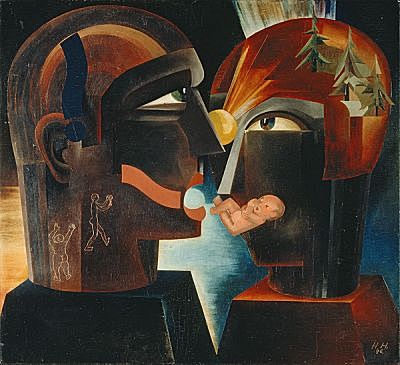
Imaginary bridge
Hannah Höch
(November 1, 1889 - May 31, 1978)
|
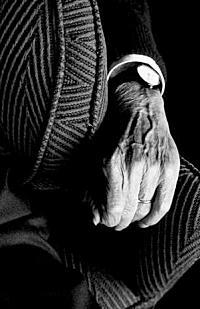
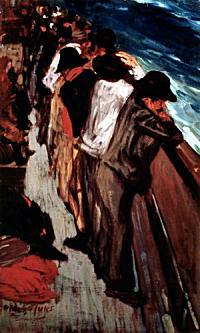



































































 The dog appears. Its head is above the line. Is the dog slipping back? Its head is on the line. Is it submerging again, tasting death as the admixture of fear and the quicksand that will eventually end the ebb and flow of life? Is it scrambling futilely up a bank that no longer holds? The dog is being defined by its eventual death. While still allowing for the severity of the animal’s predicament, its appearance may be precisely the ebb and flow, thus a continuity of life not structured by death but by having-to-exist. Within what then does the dog appear? The question has force precisely because it has an exigency that cannot be escaped since neither answer nor direct resolution is at hand. The question endures. Once allowed, the question repositions the line. No longer mere appearance, the line is neither the sign of a simple division nor is it able to sustain a simple either/or. Death cannot be equated with the dark. Equally, the light cannot be reduced to the life that may be escaping. (Though it should not be forgotten that Goya’s work belongs to the so-called Black Paintings.) The dog’s head interrupts the line. As a result, what is opened is a site. Perhaps, to use a word that will play an important role in the analysis to come, what emerges is an écart that refuses simple and symmetrical oppositions.(....)
The dog appears. Its head is above the line. Is the dog slipping back? Its head is on the line. Is it submerging again, tasting death as the admixture of fear and the quicksand that will eventually end the ebb and flow of life? Is it scrambling futilely up a bank that no longer holds? The dog is being defined by its eventual death. While still allowing for the severity of the animal’s predicament, its appearance may be precisely the ebb and flow, thus a continuity of life not structured by death but by having-to-exist. Within what then does the dog appear? The question has force precisely because it has an exigency that cannot be escaped since neither answer nor direct resolution is at hand. The question endures. Once allowed, the question repositions the line. No longer mere appearance, the line is neither the sign of a simple division nor is it able to sustain a simple either/or. Death cannot be equated with the dark. Equally, the light cannot be reduced to the life that may be escaping. (Though it should not be forgotten that Goya’s work belongs to the so-called Black Paintings.) The dog’s head interrupts the line. As a result, what is opened is a site. Perhaps, to use a word that will play an important role in the analysis to come, what emerges is an écart that refuses simple and symmetrical oppositions.(....)